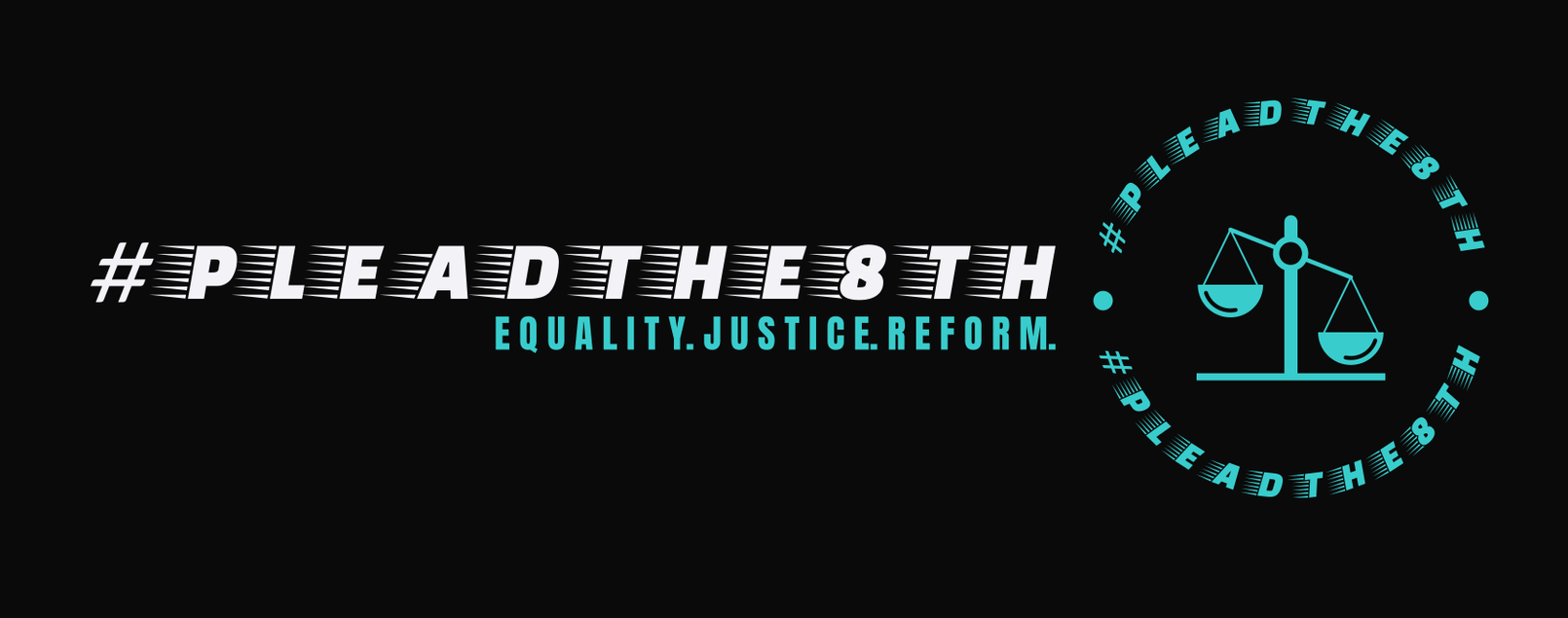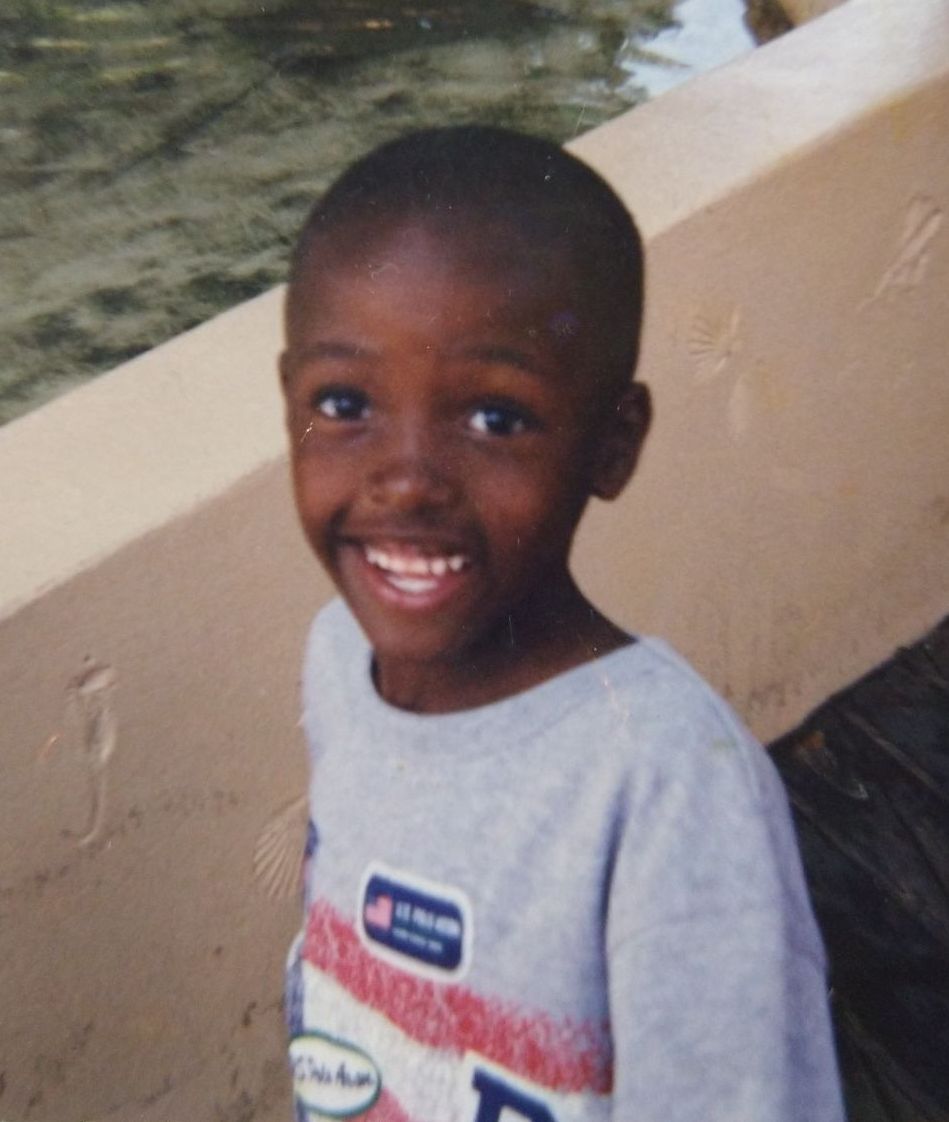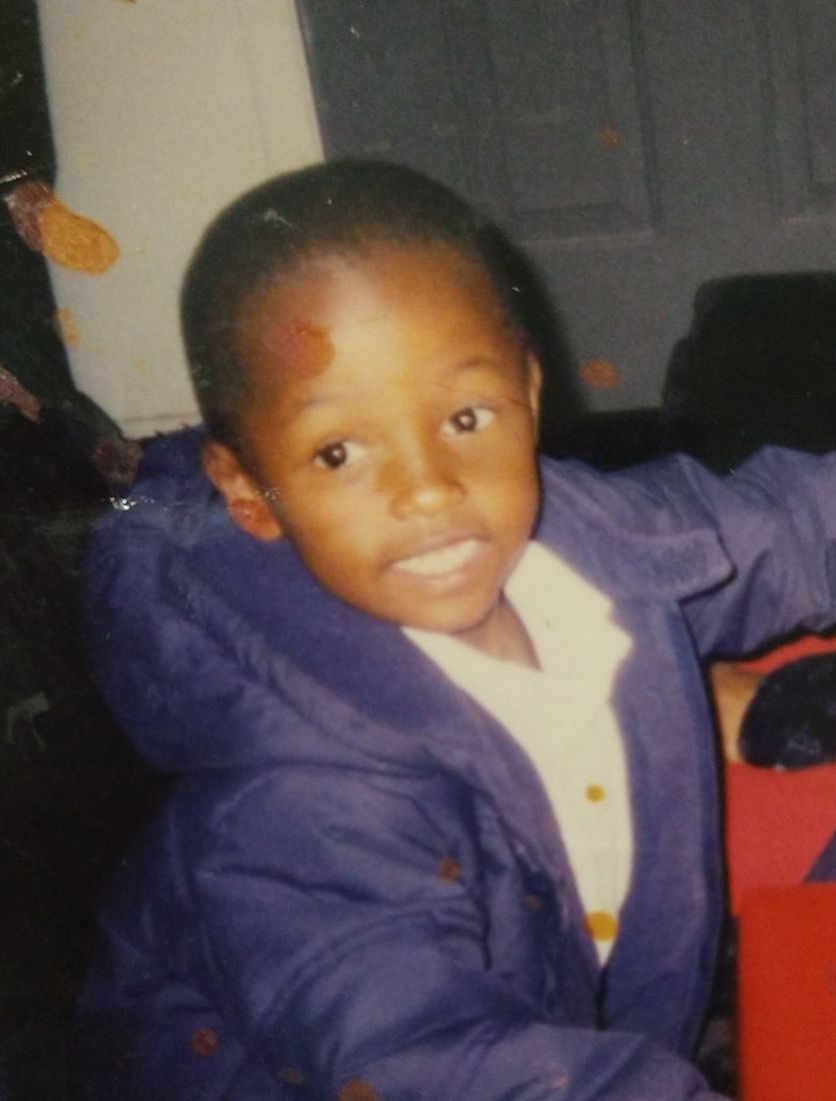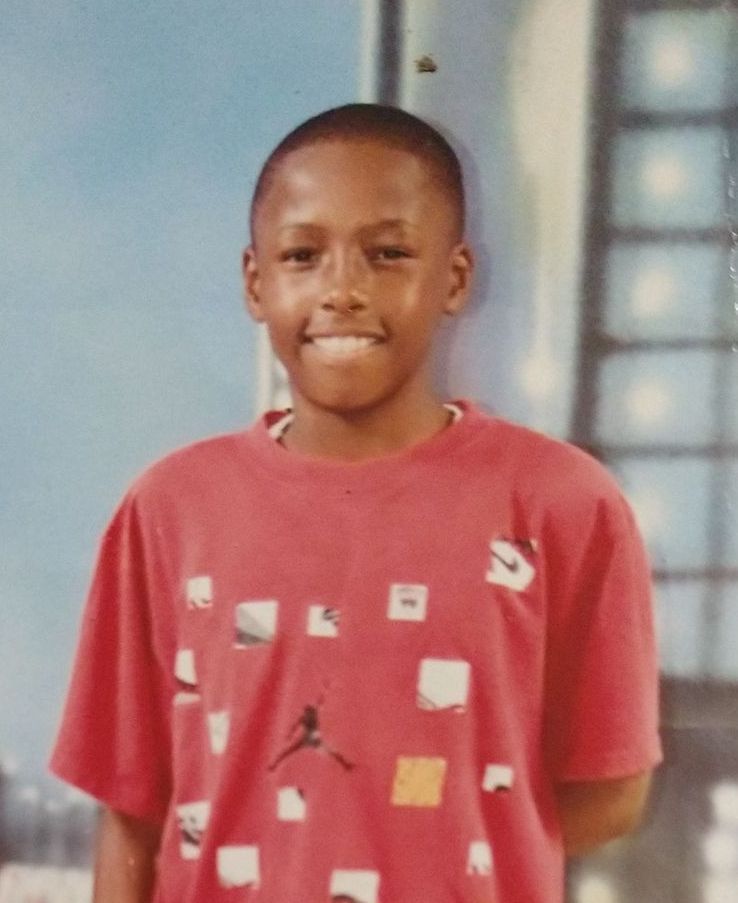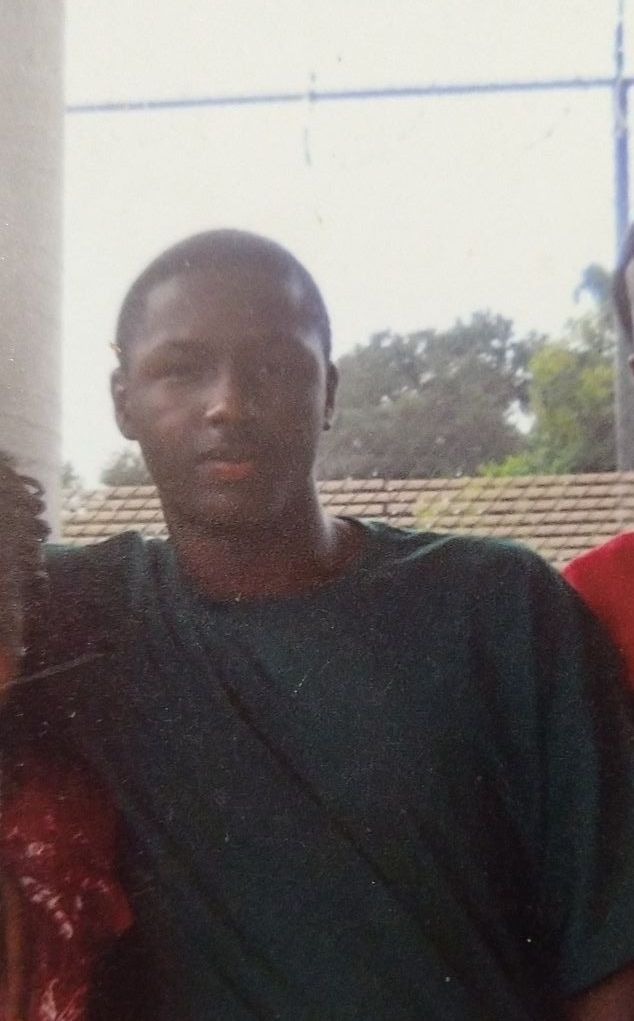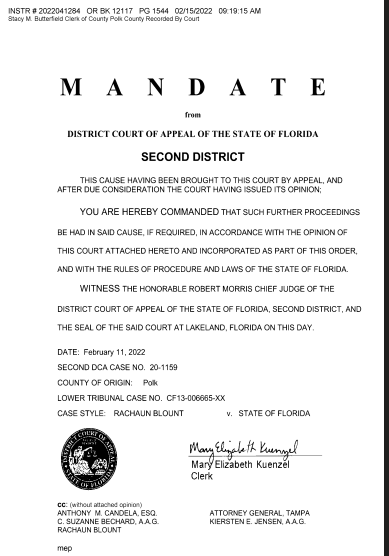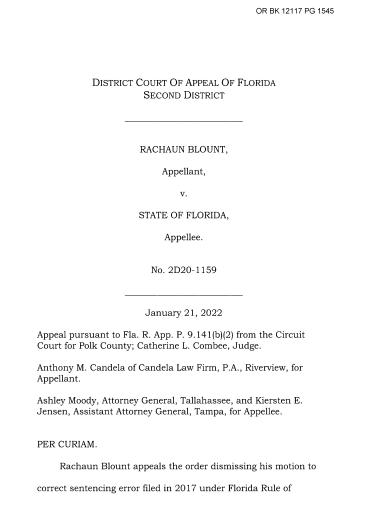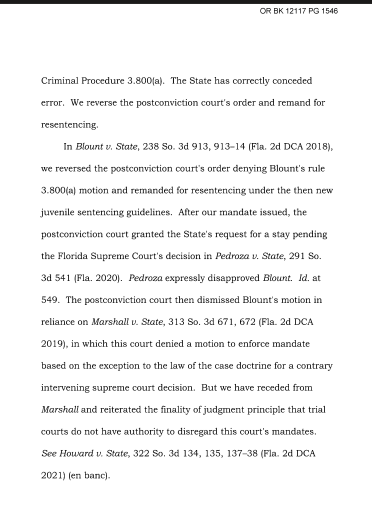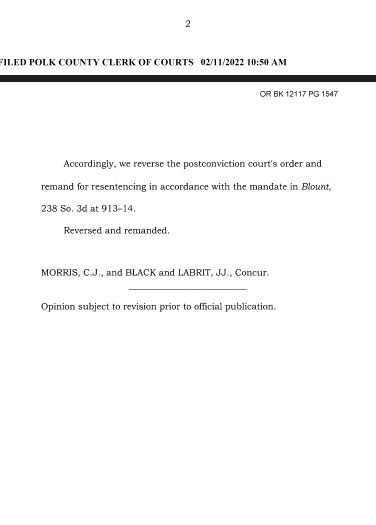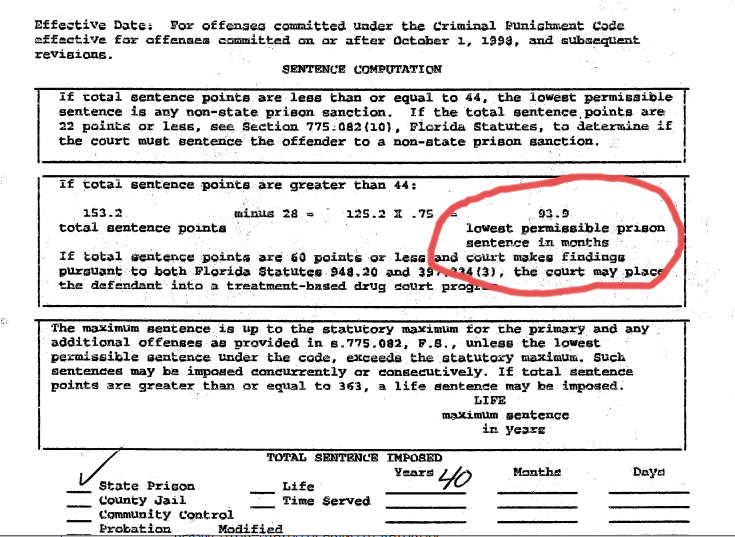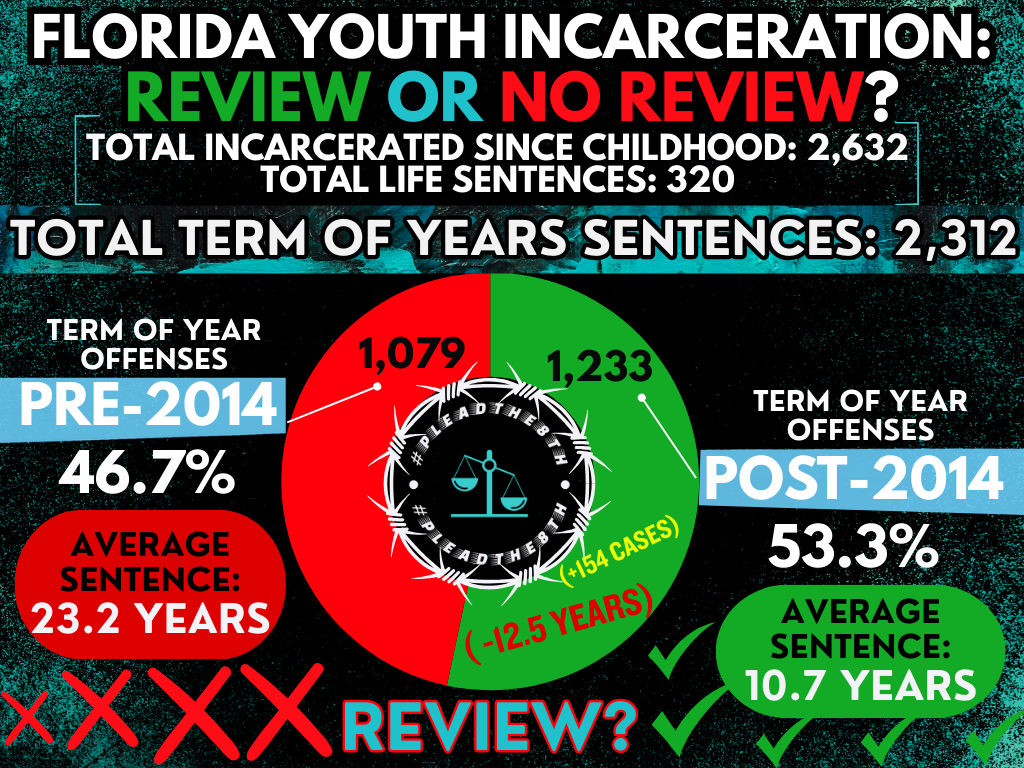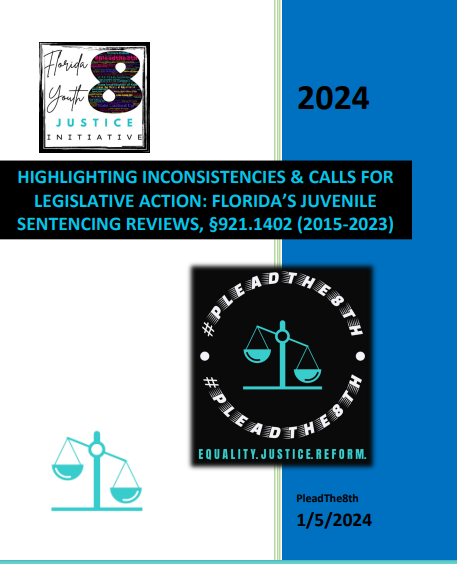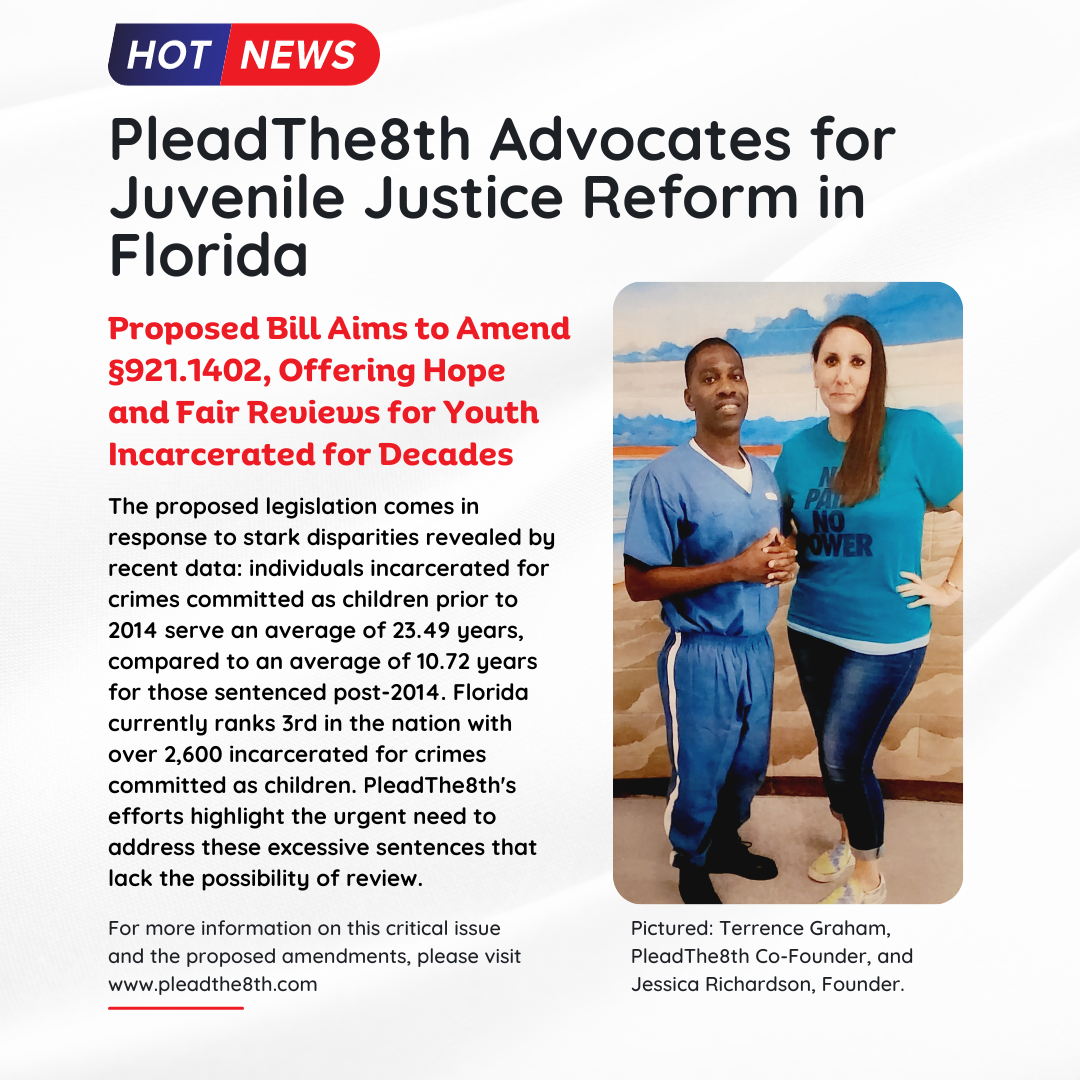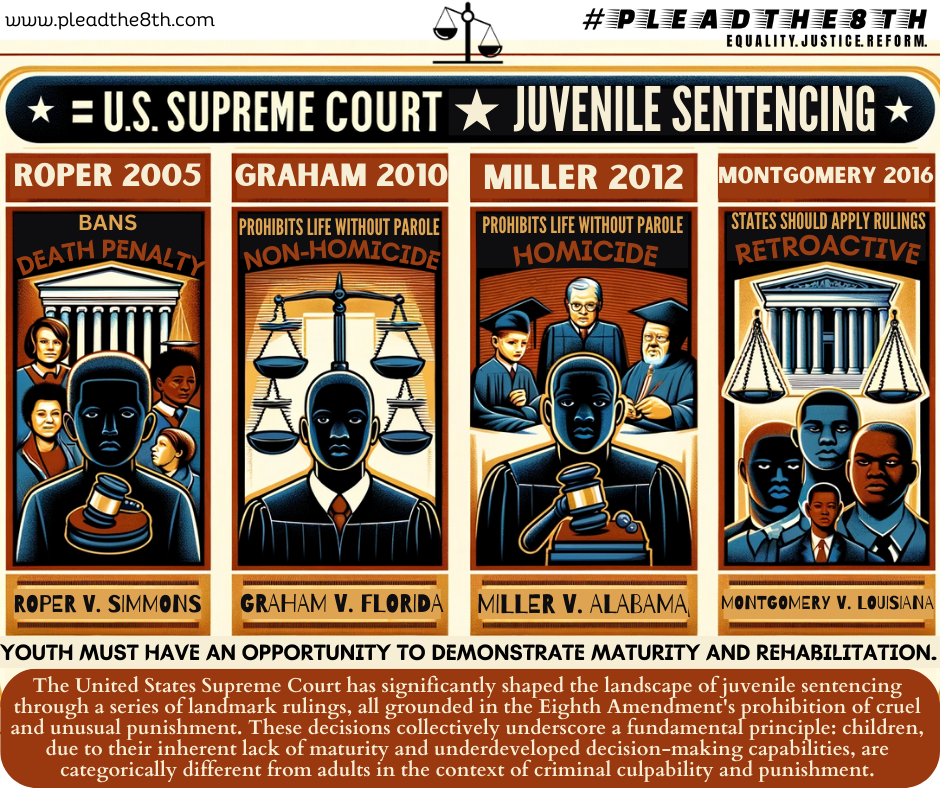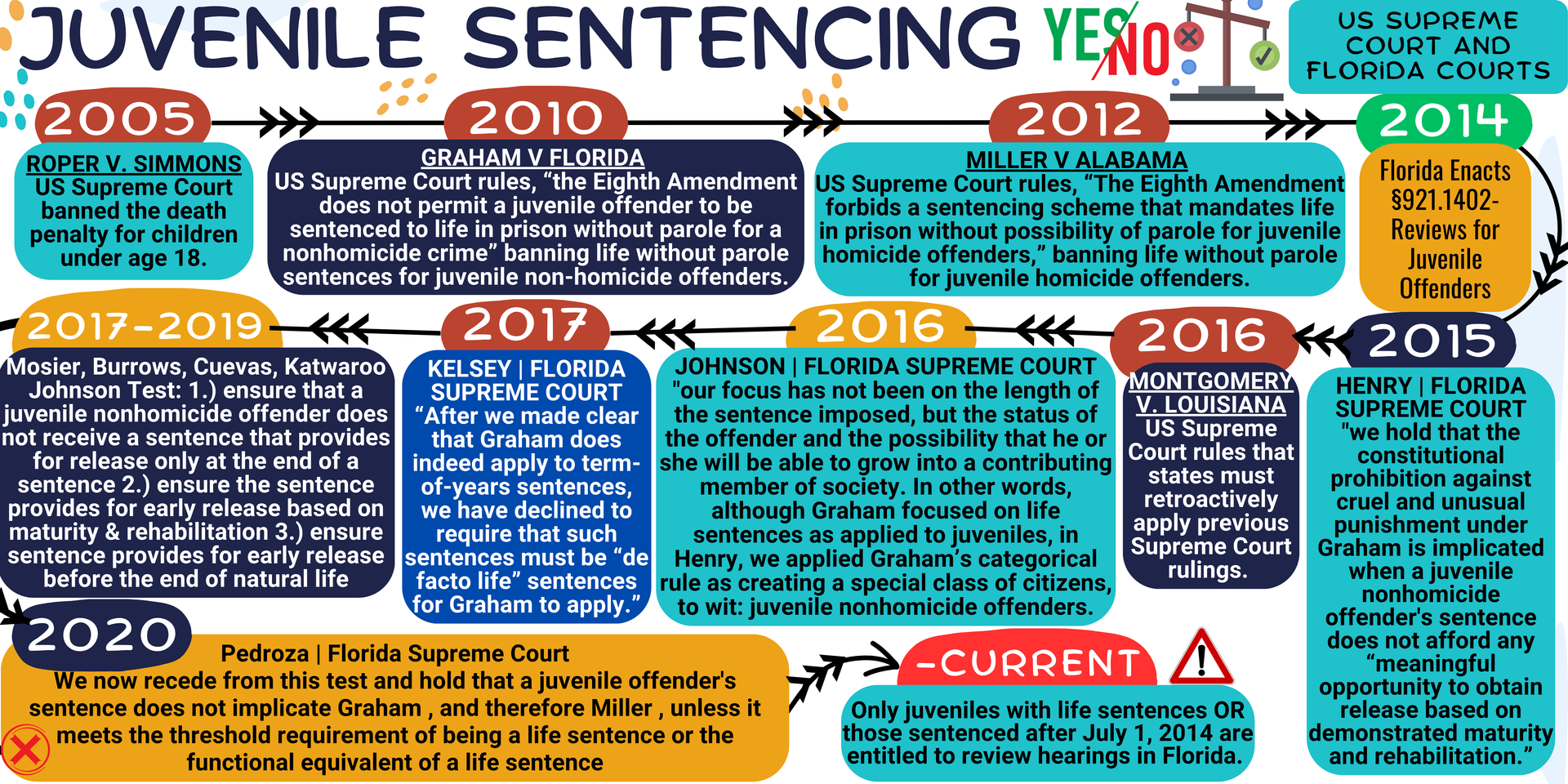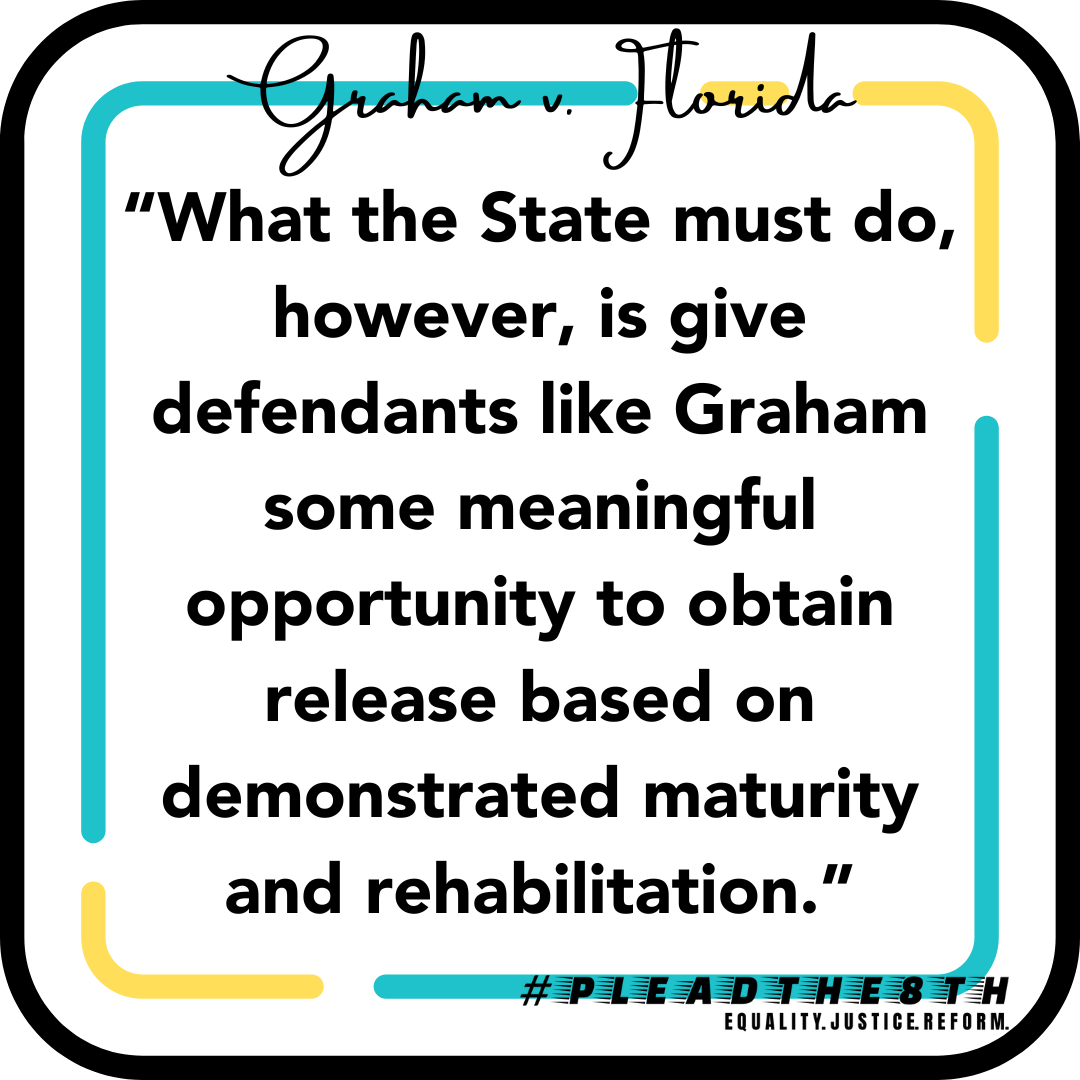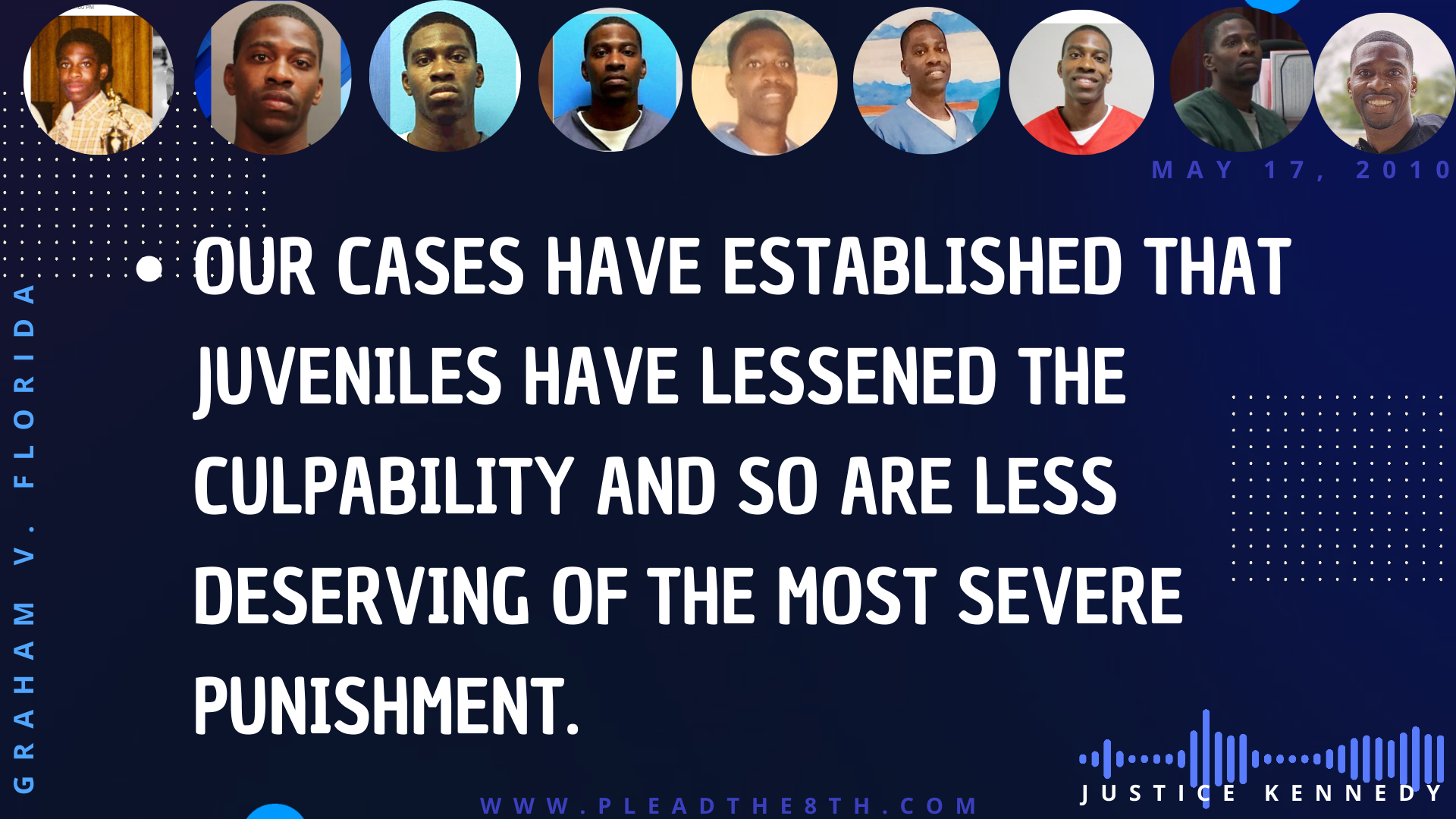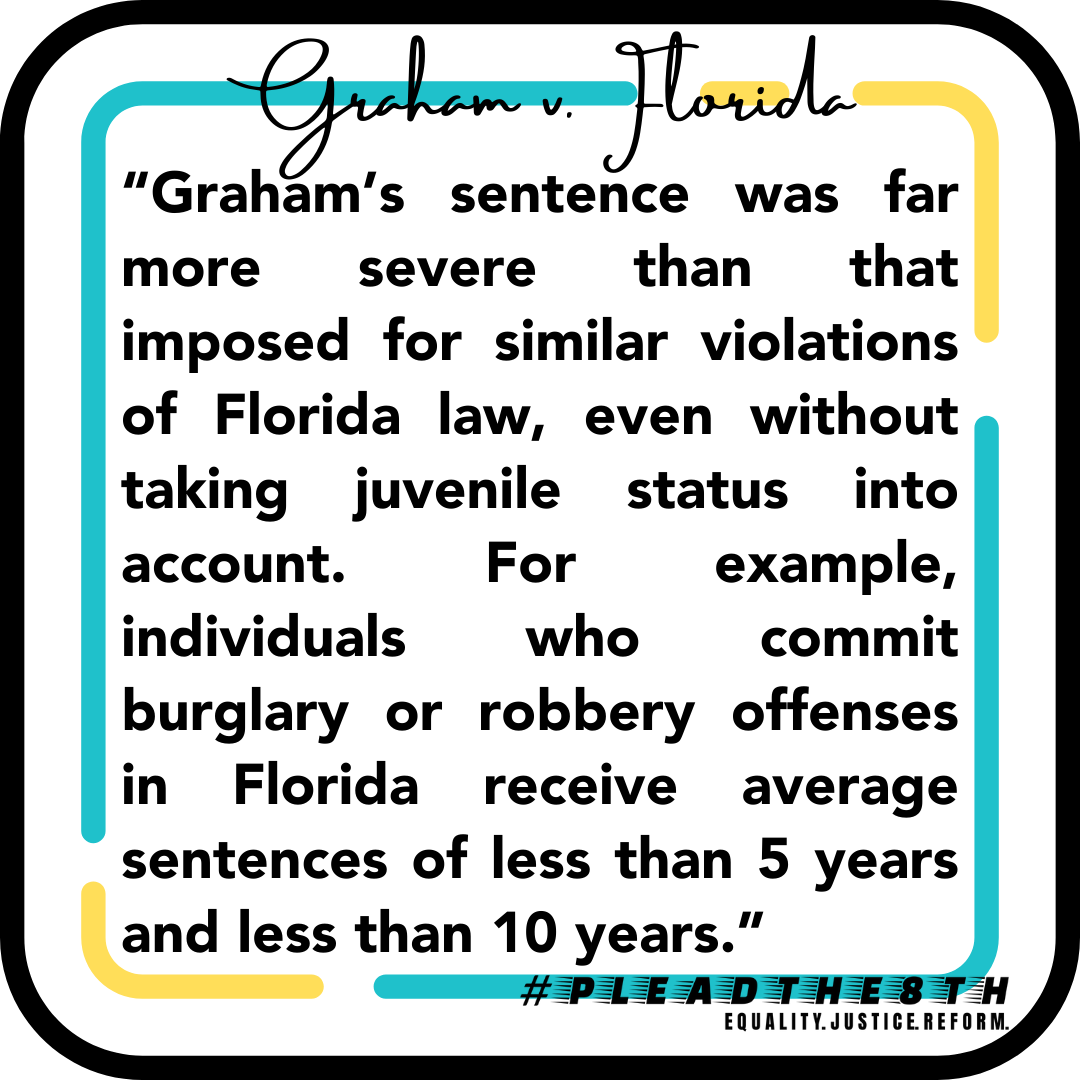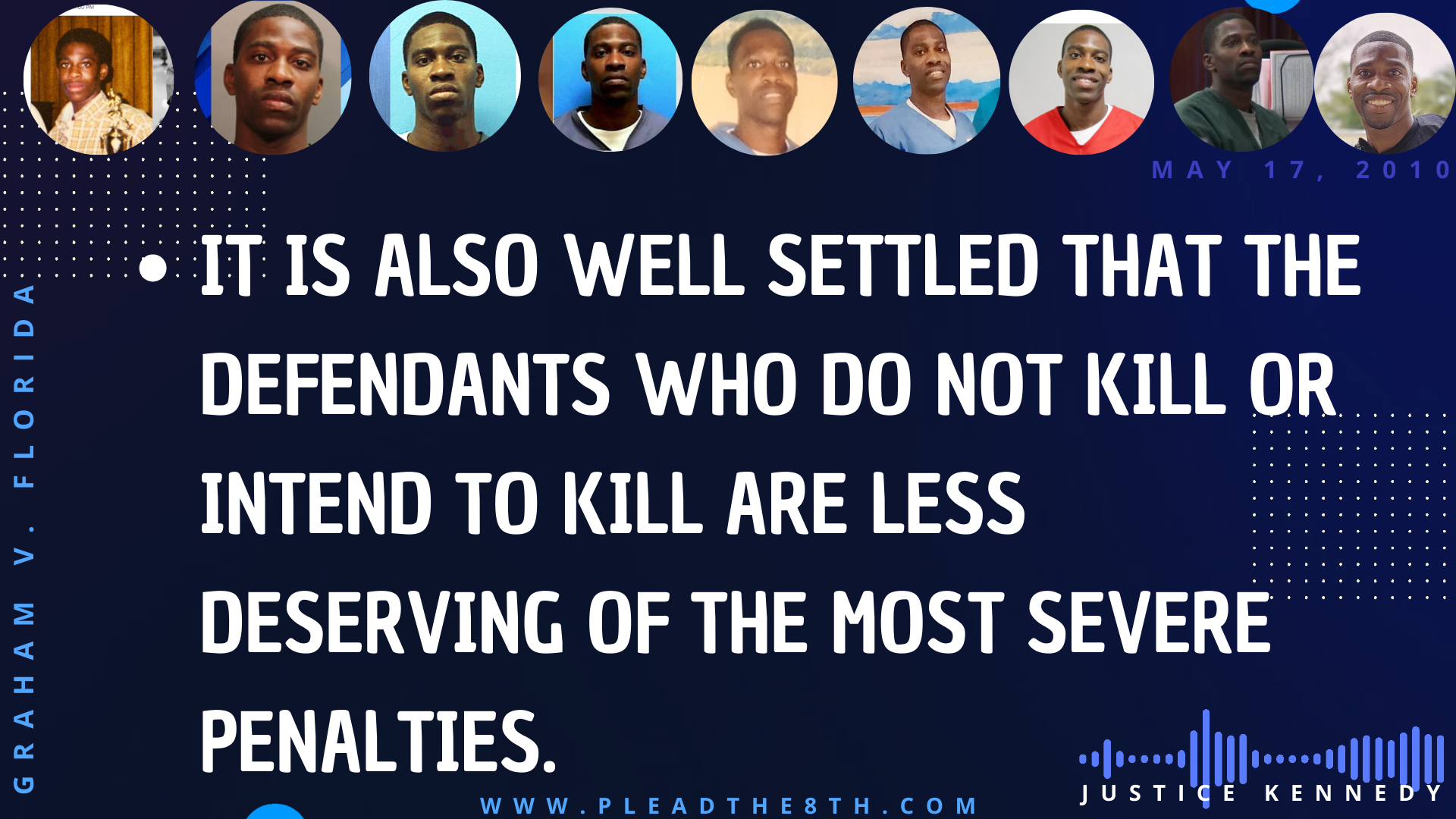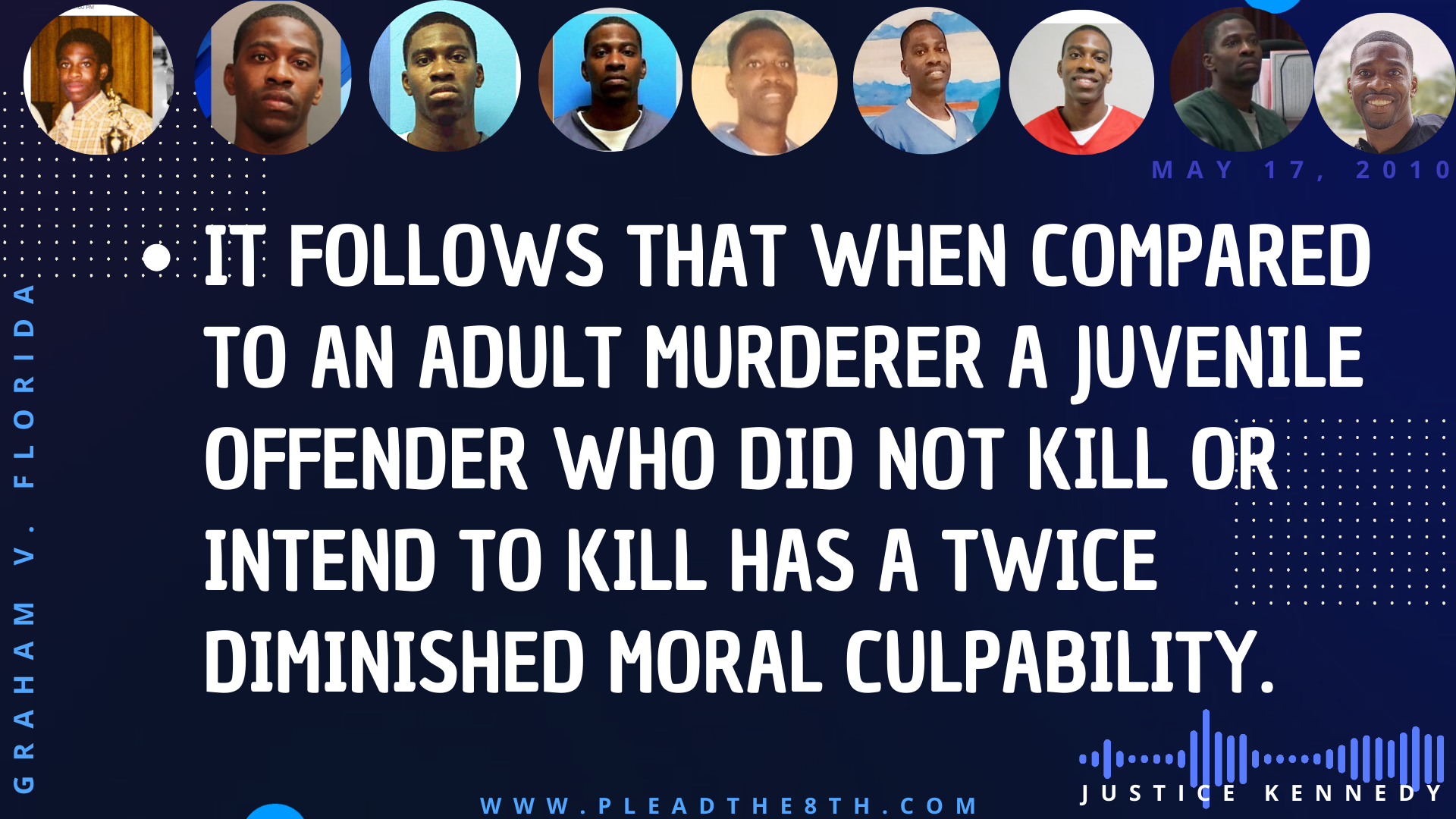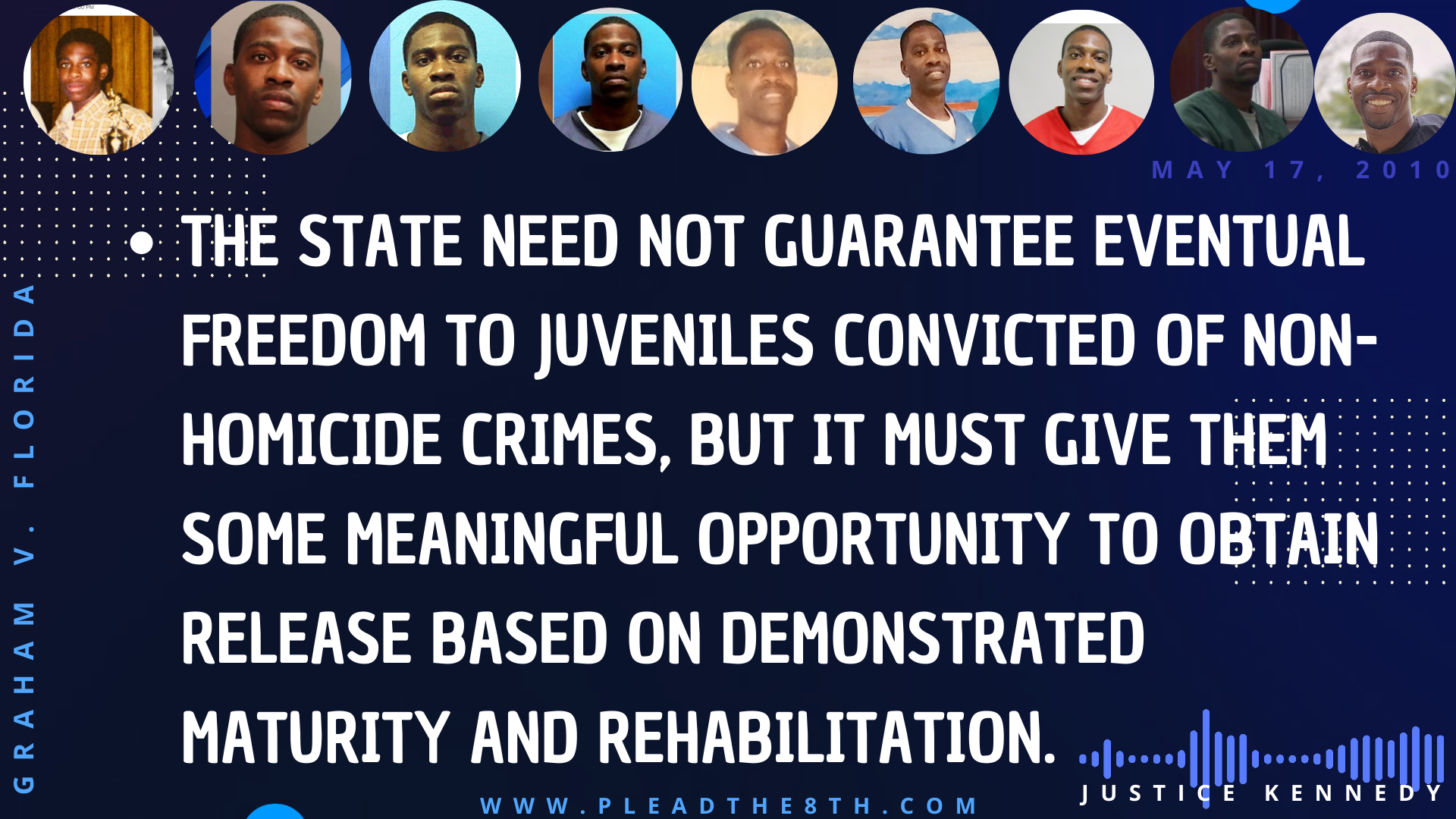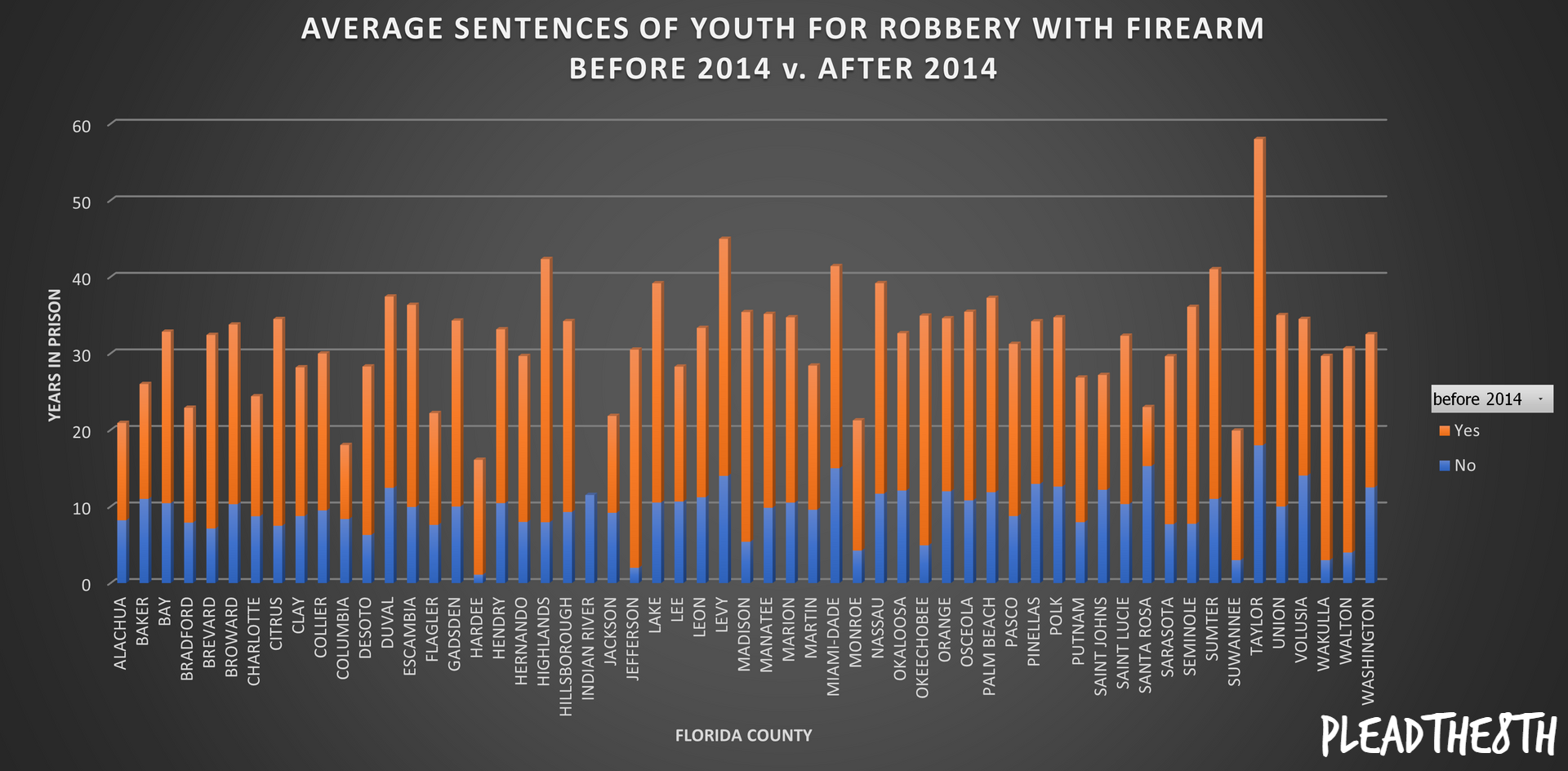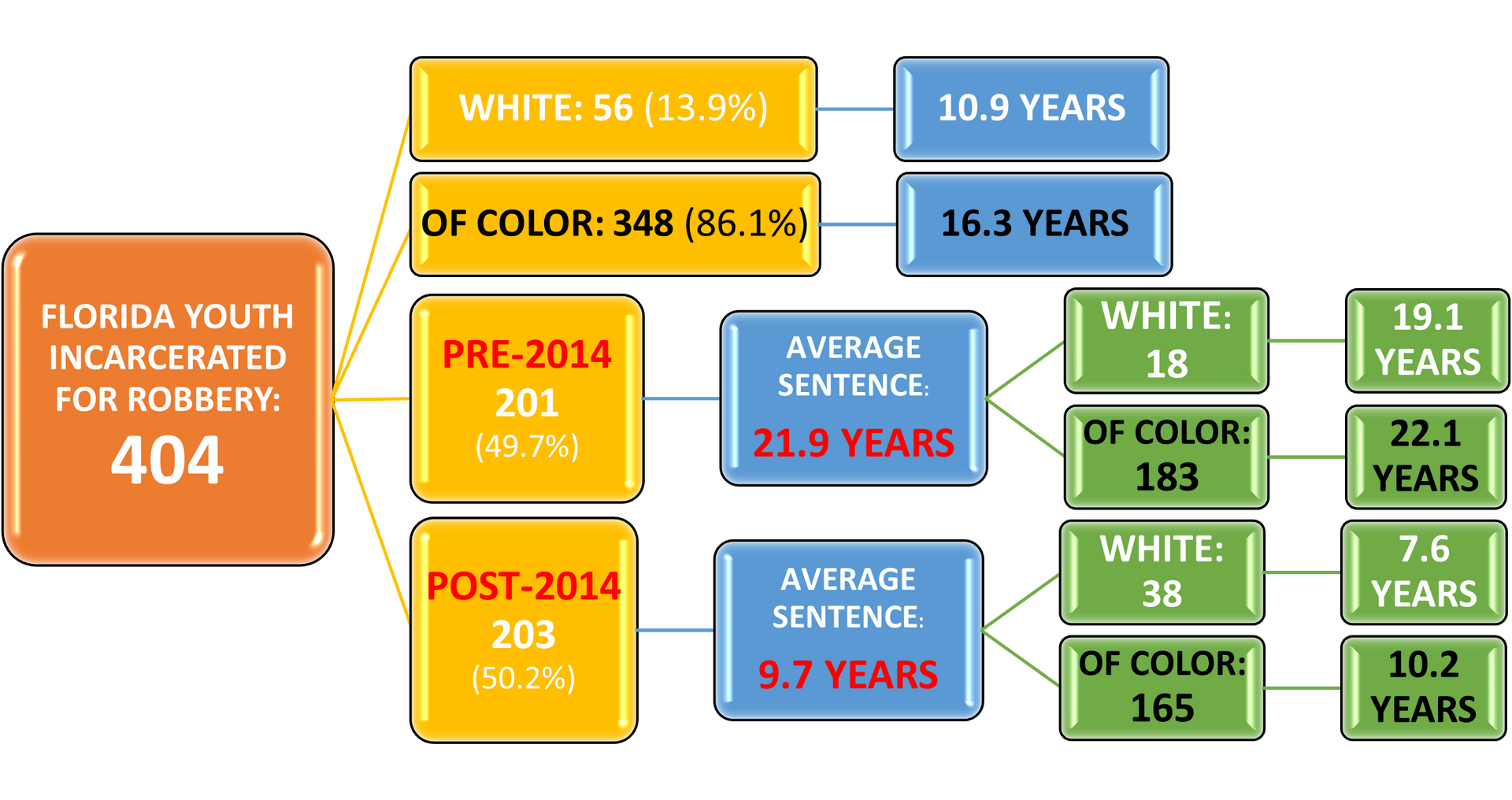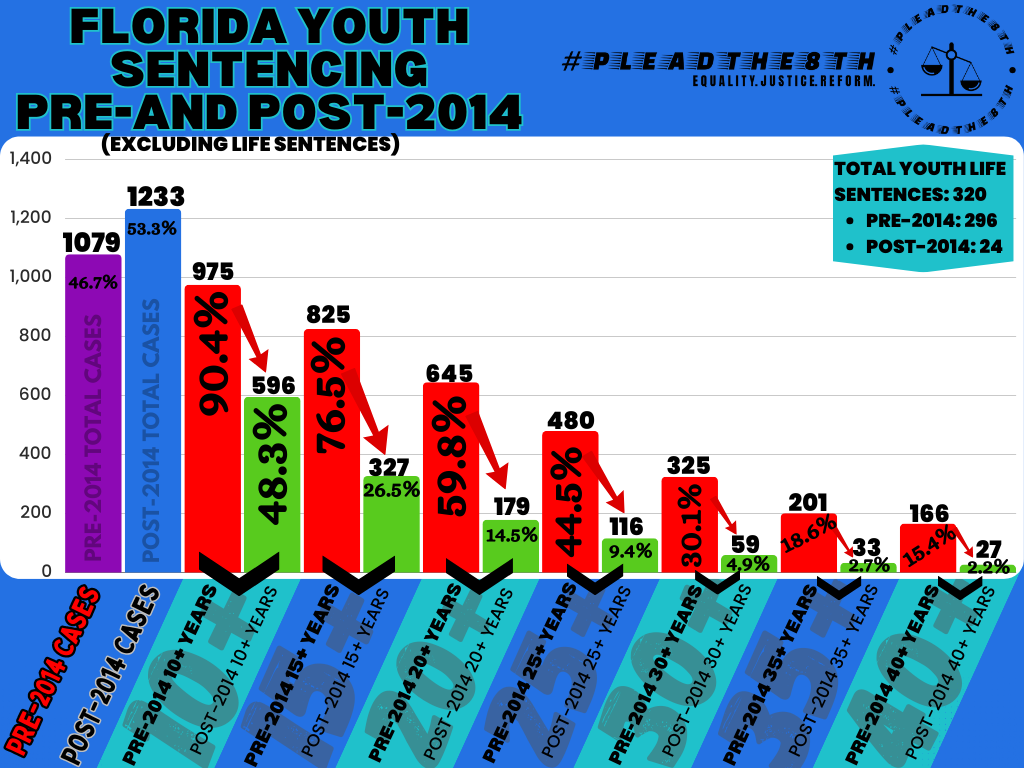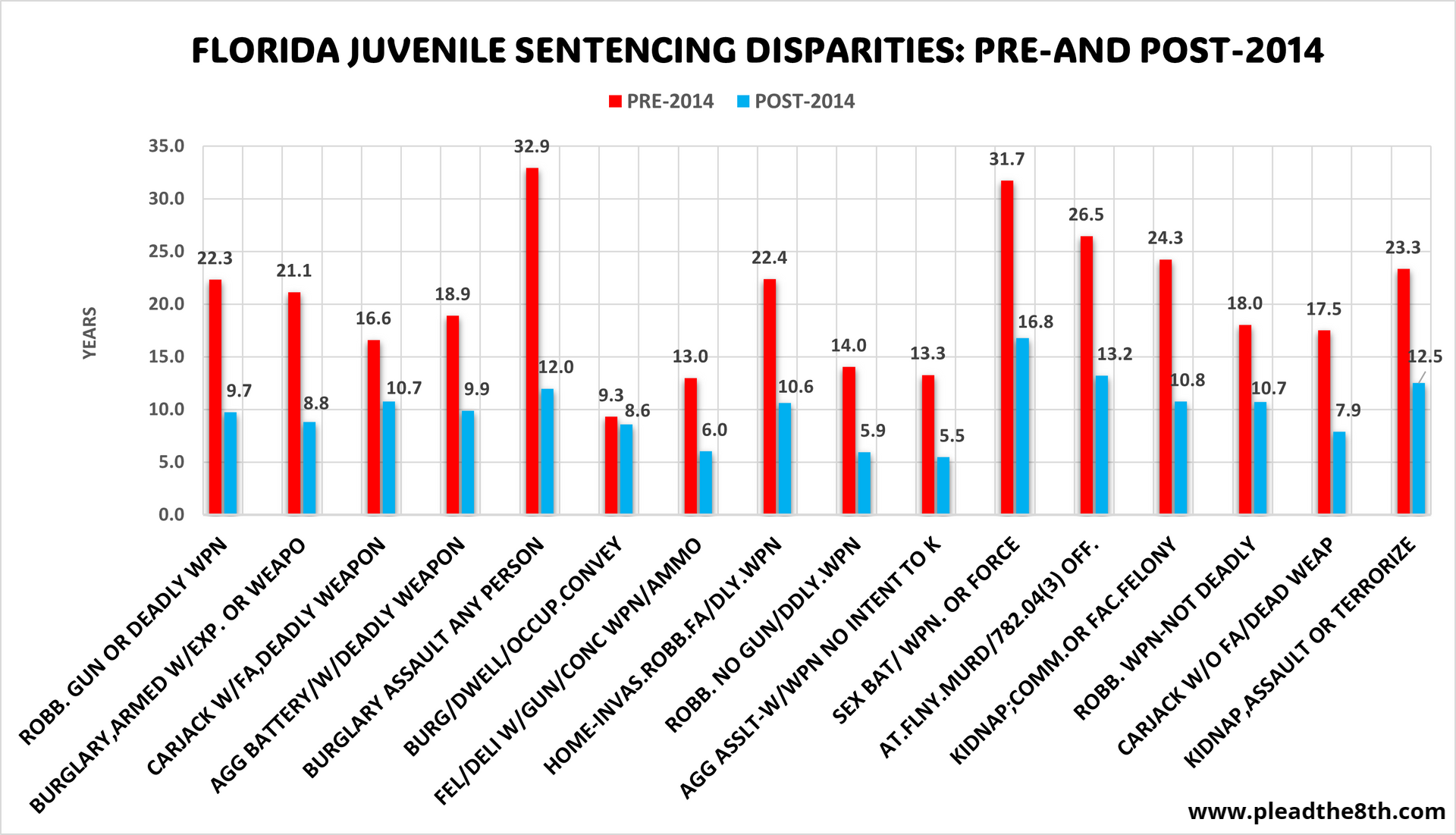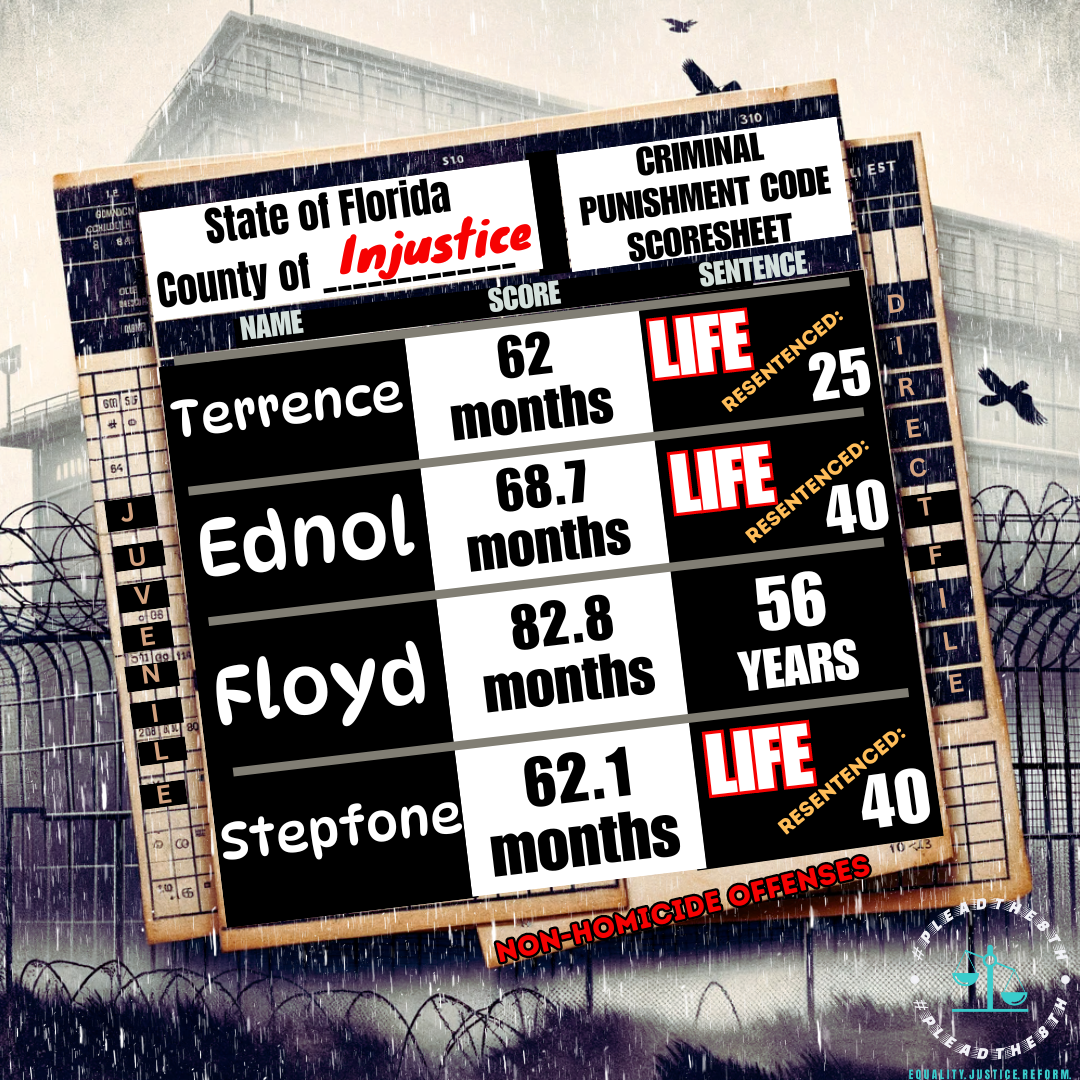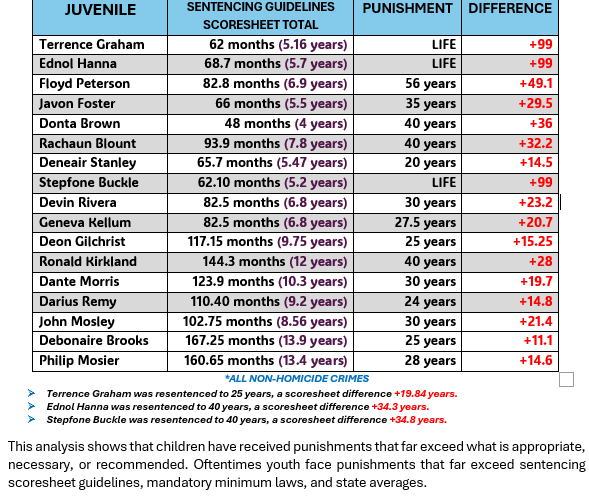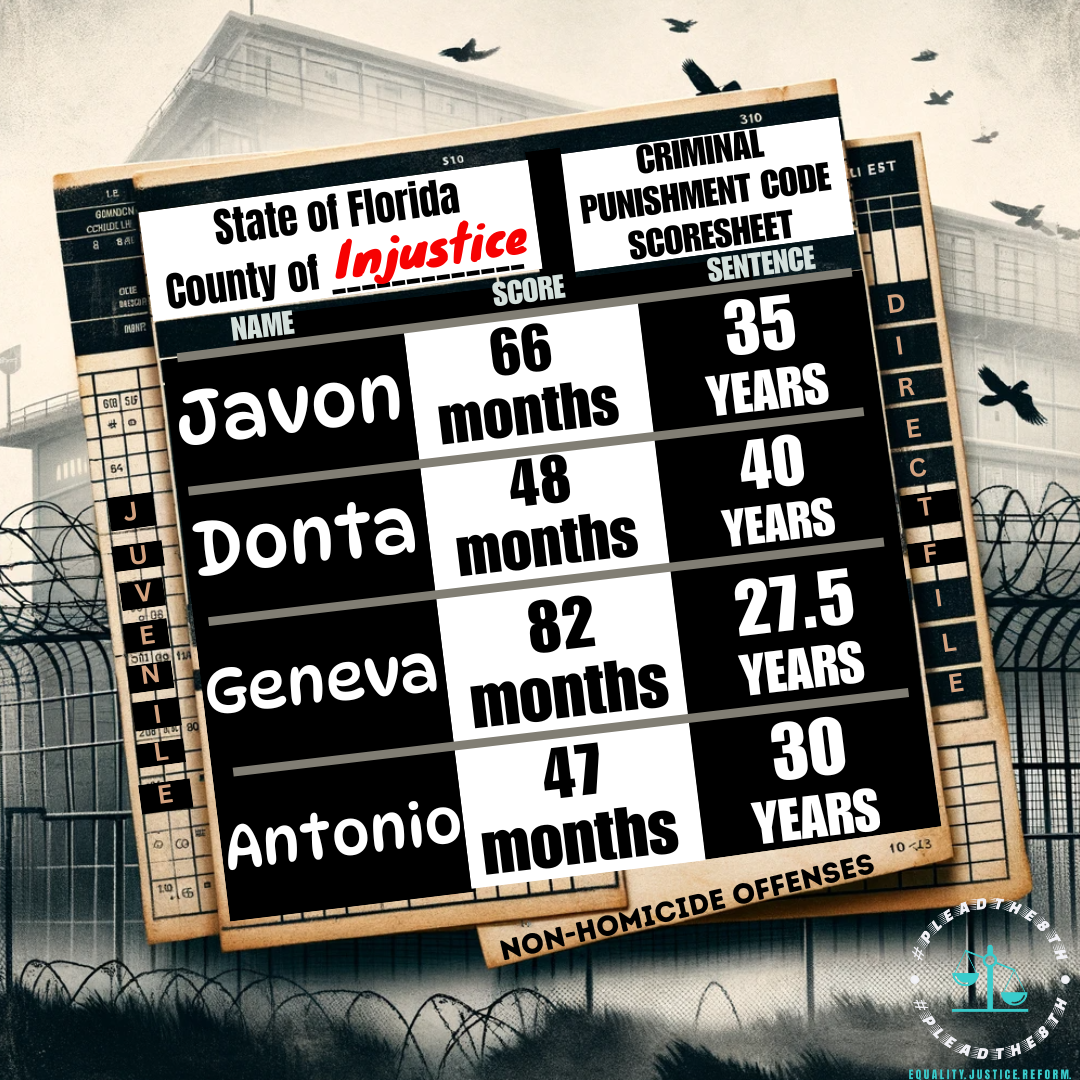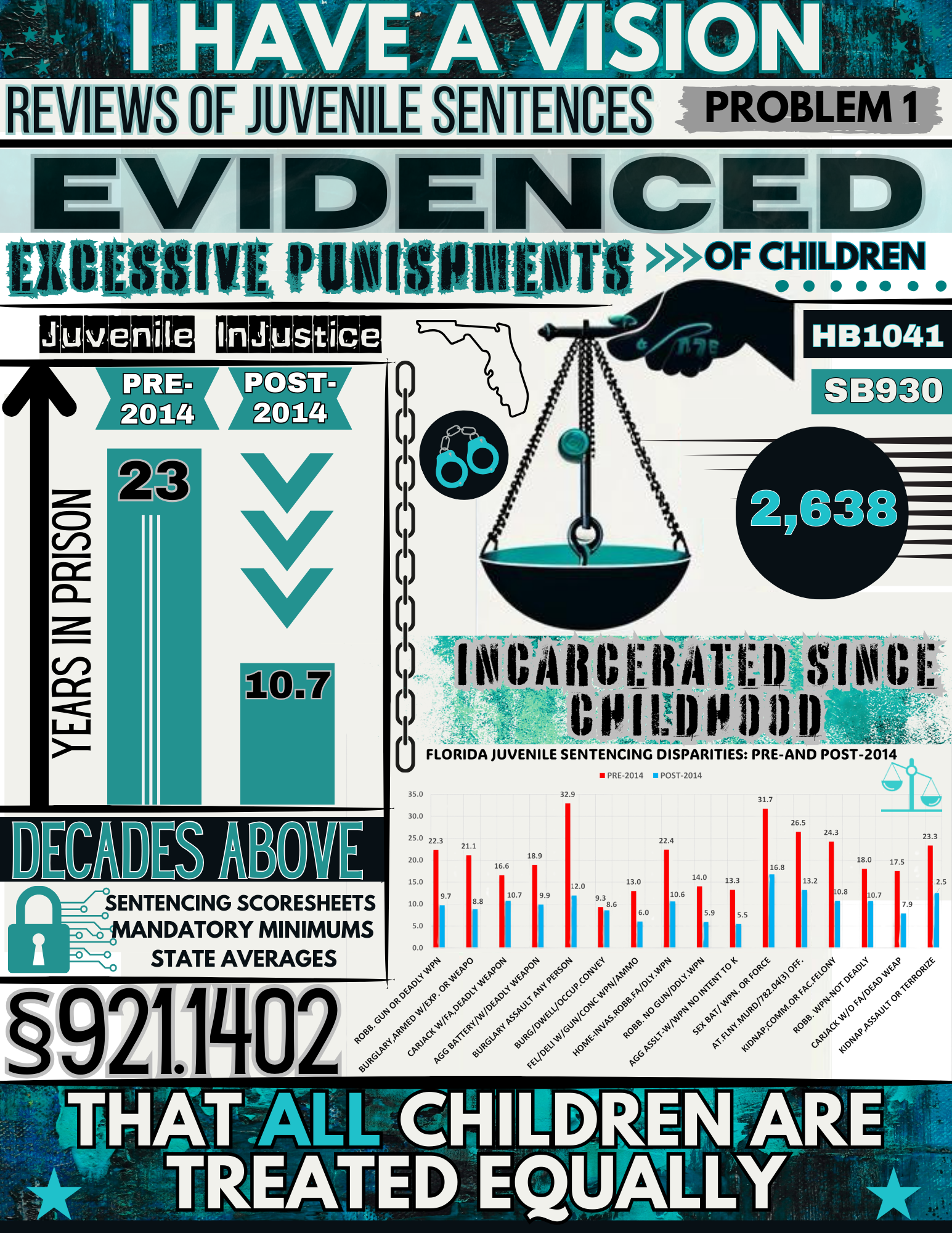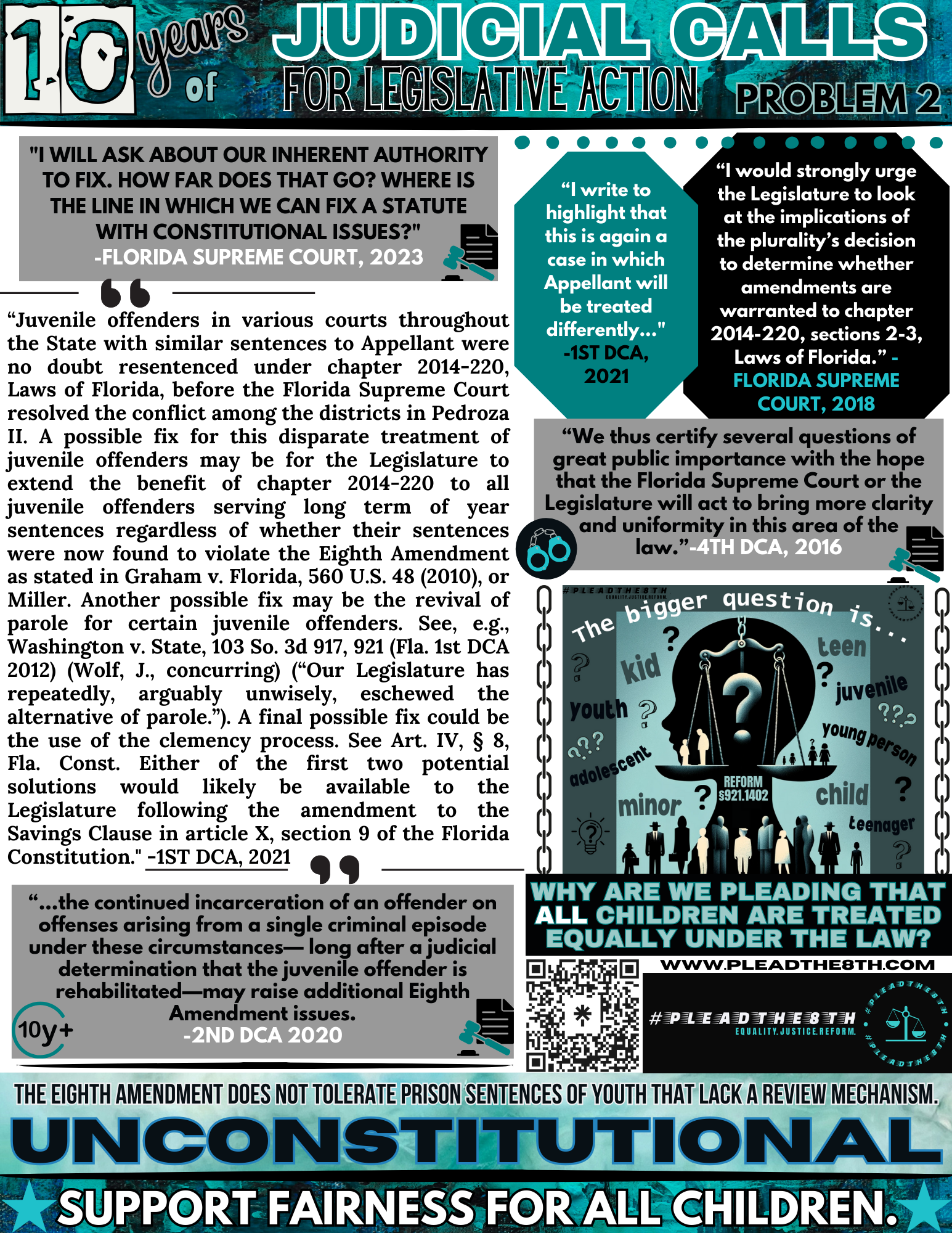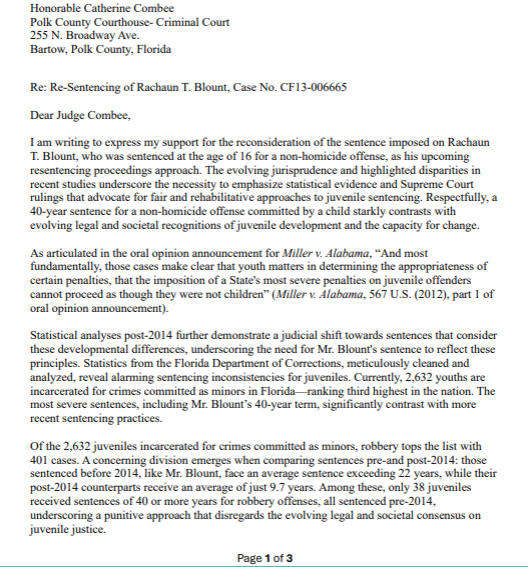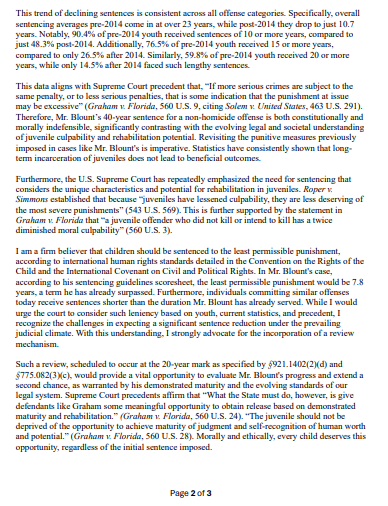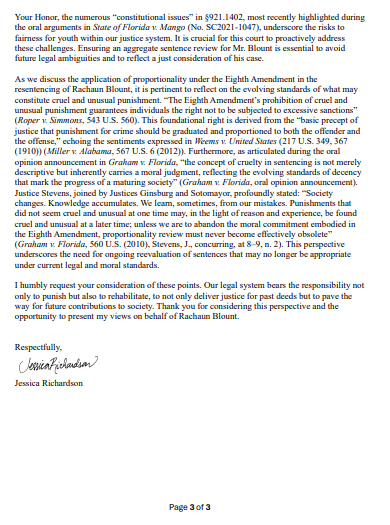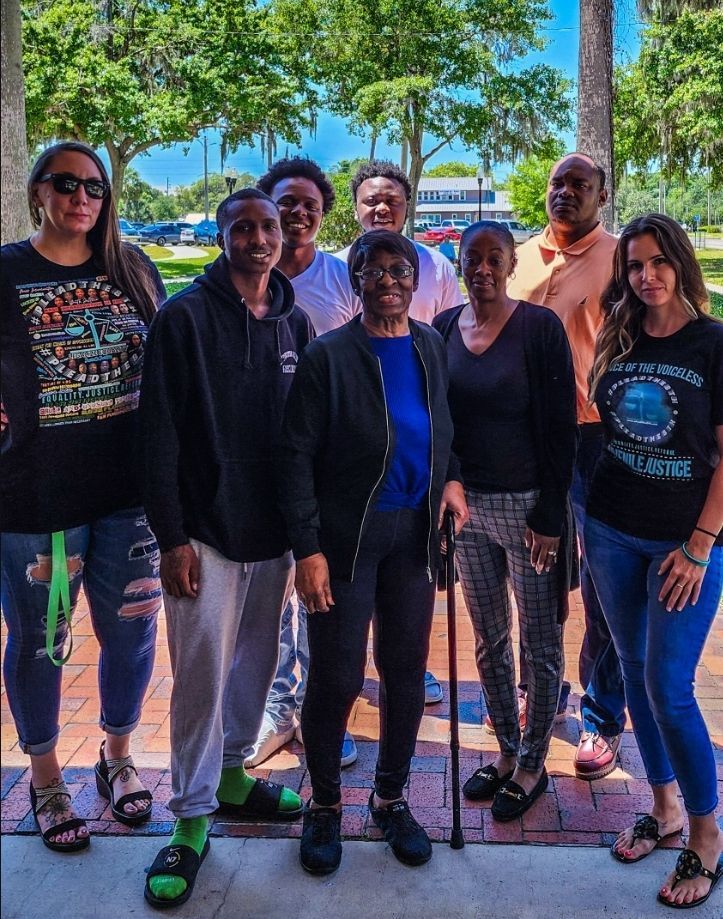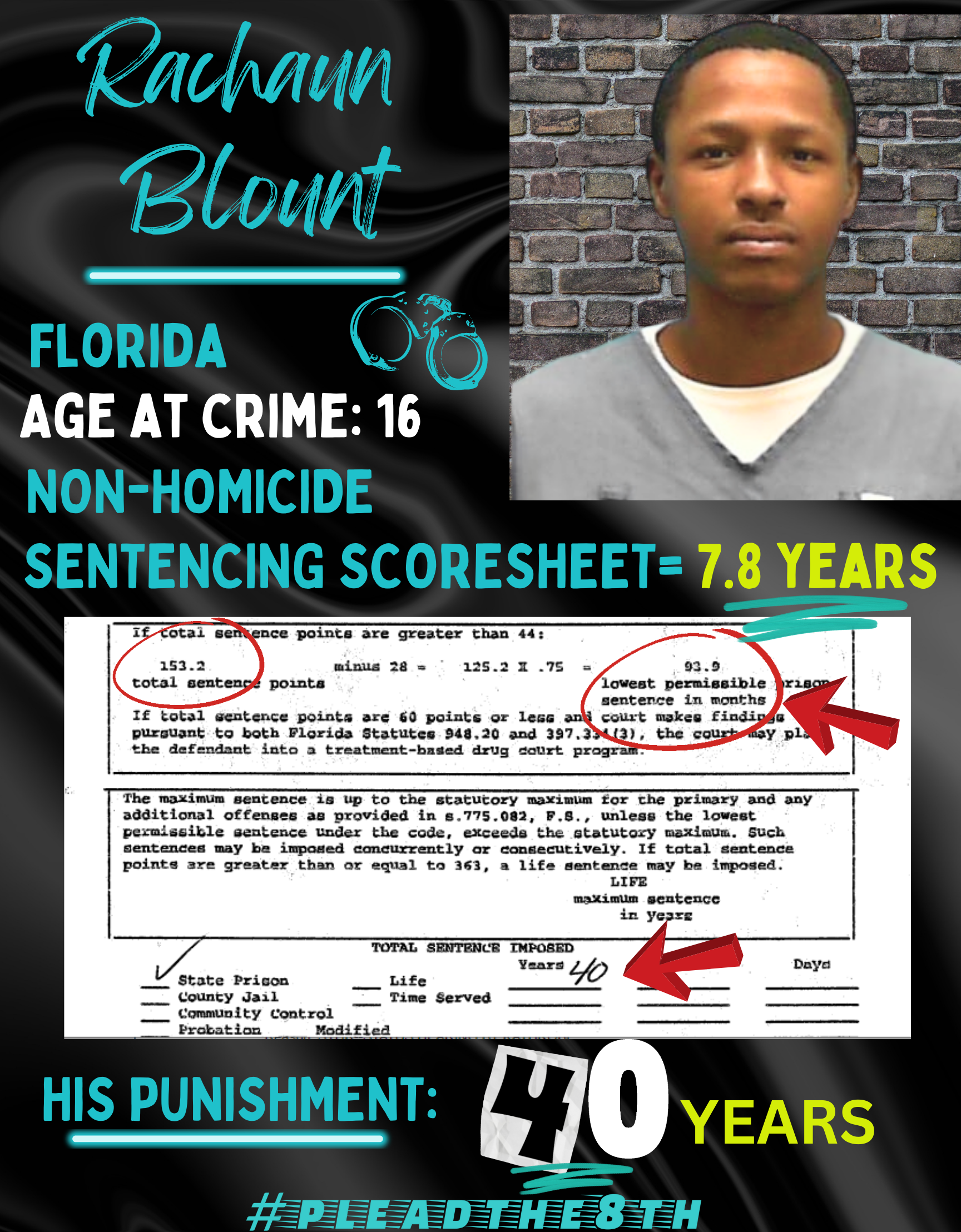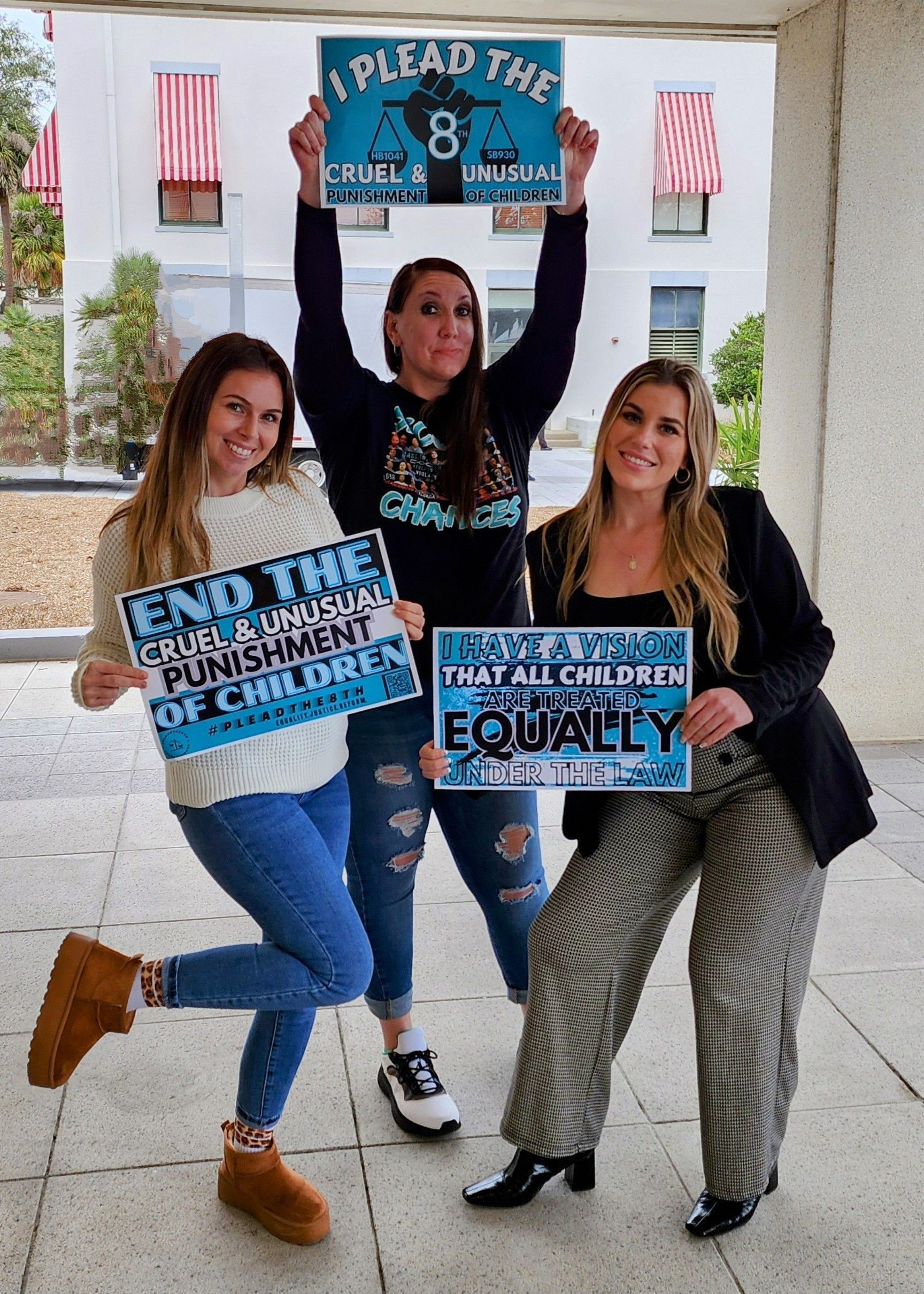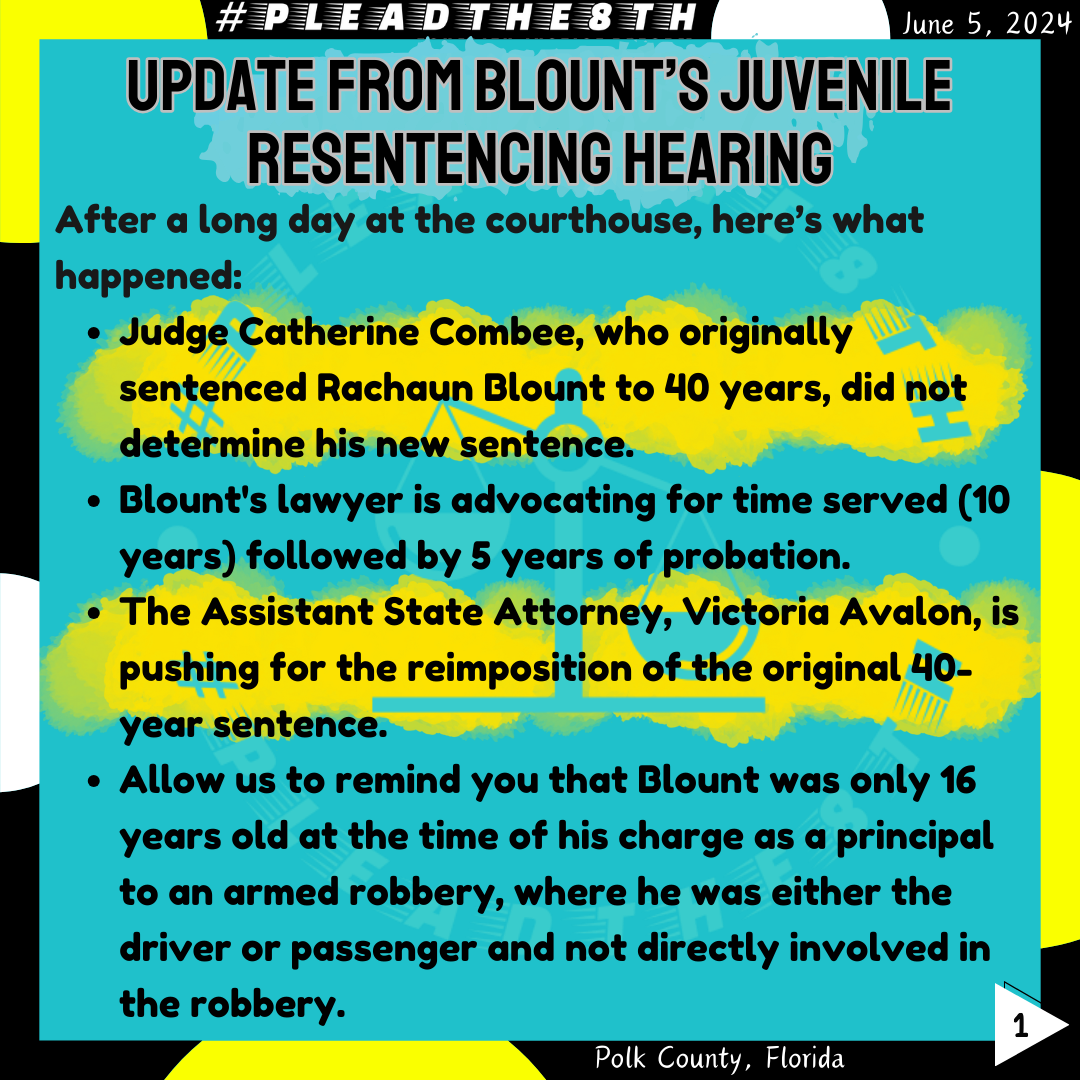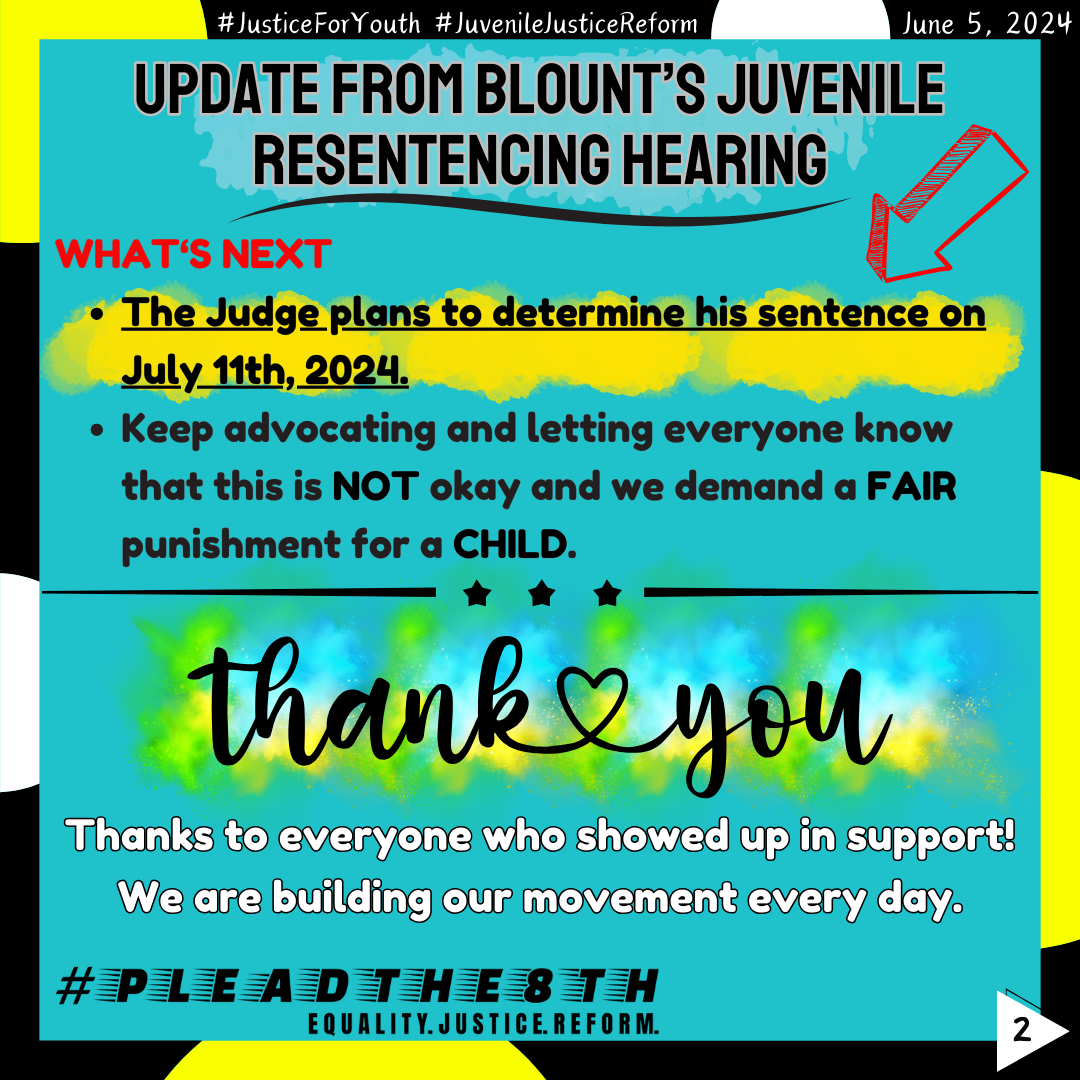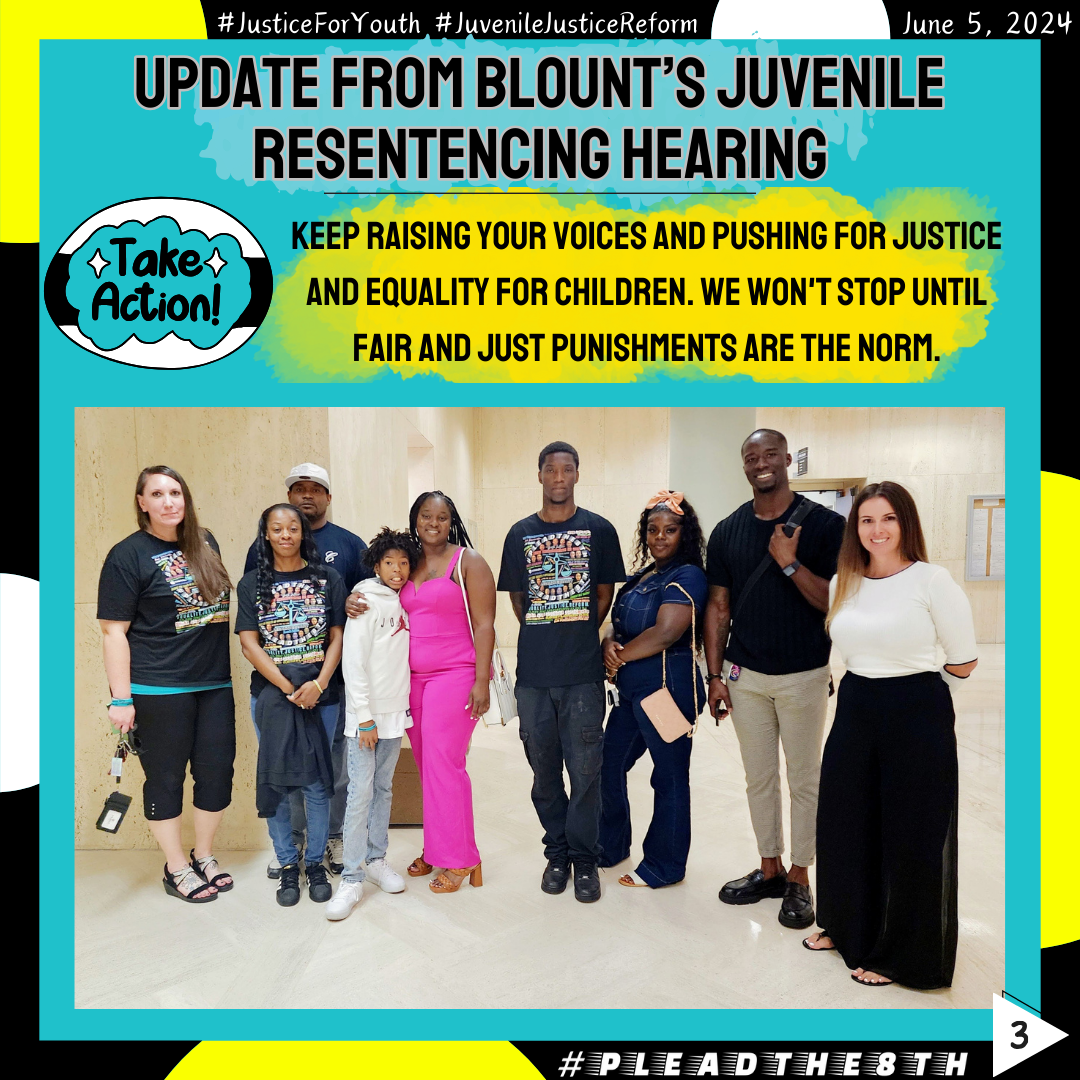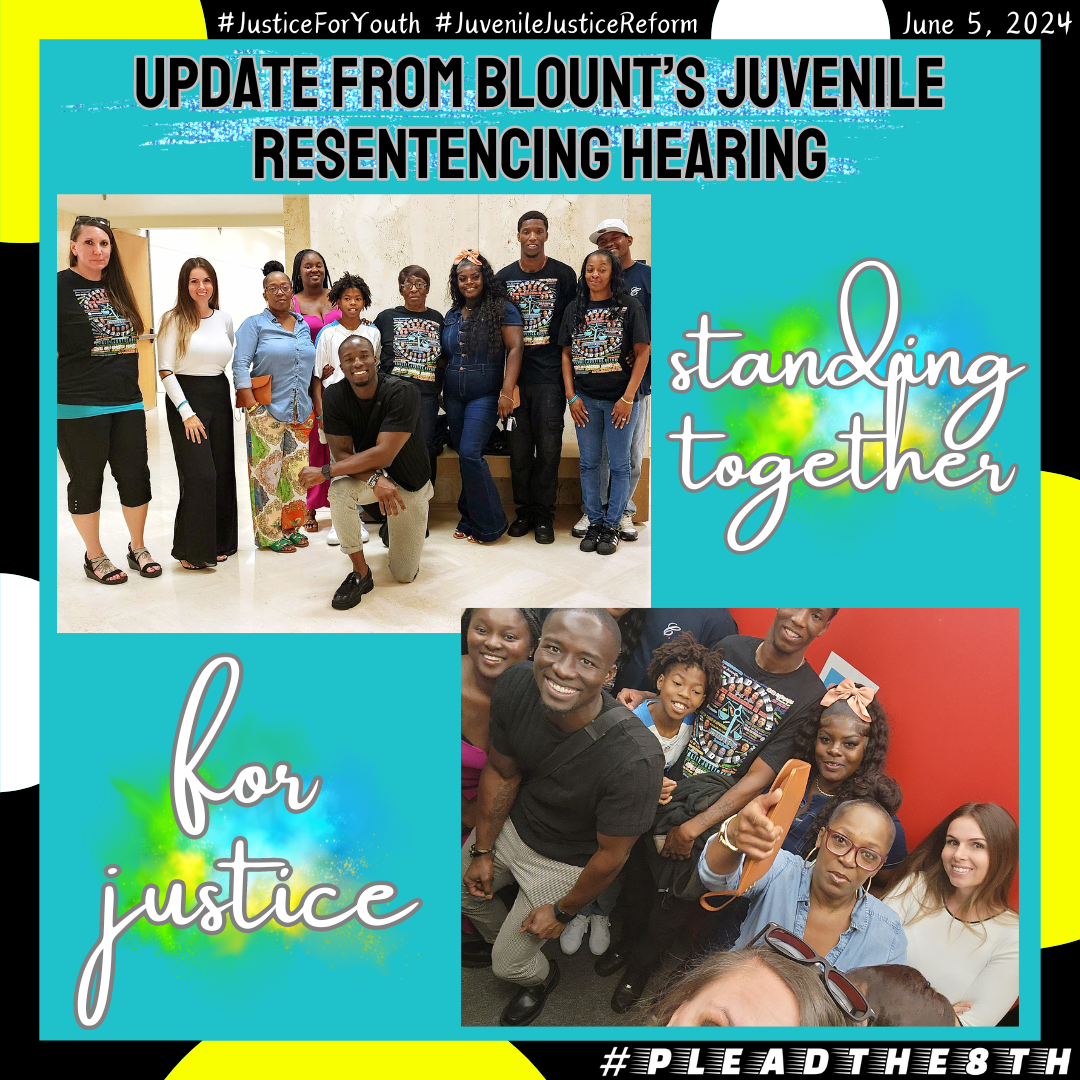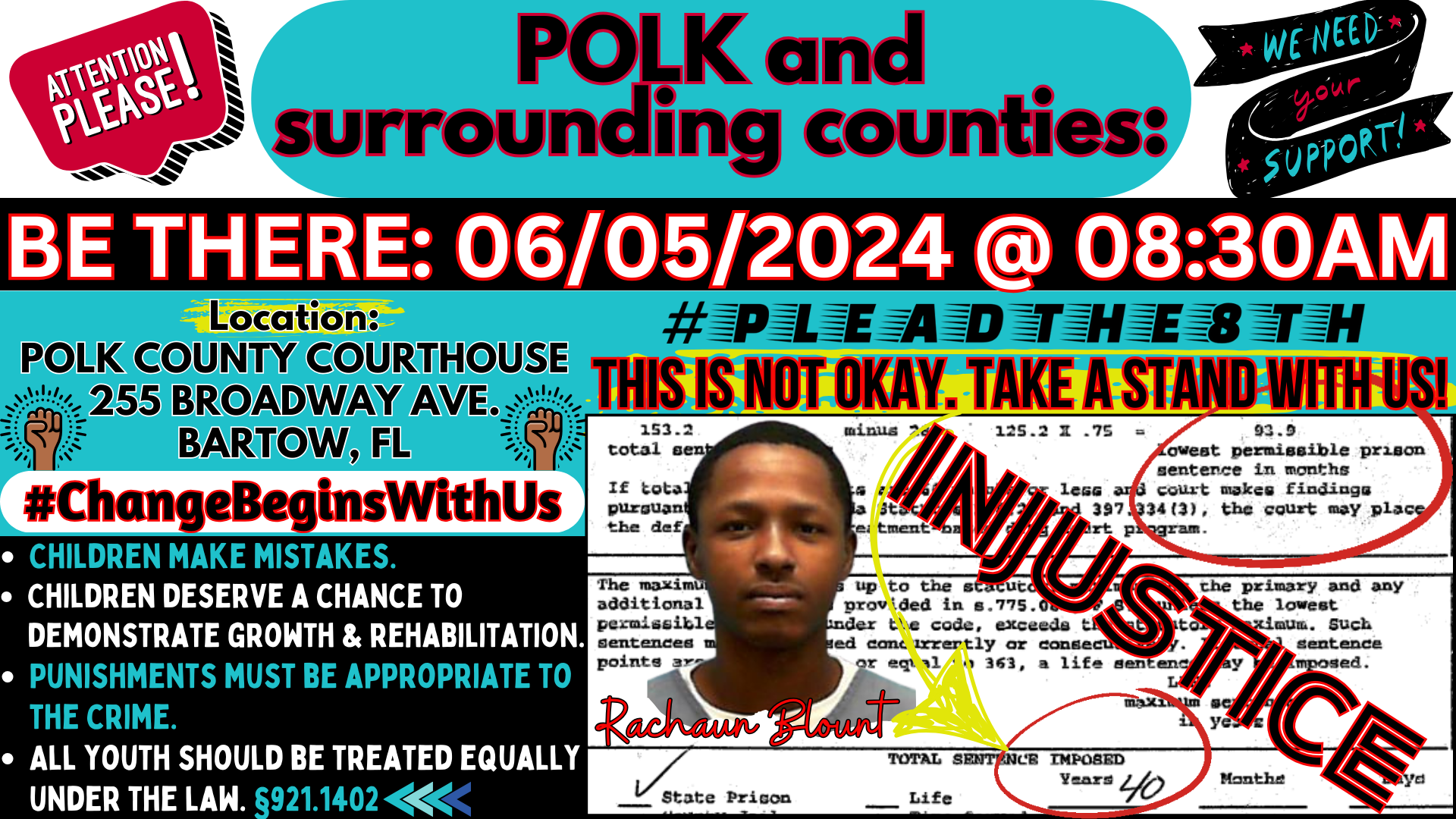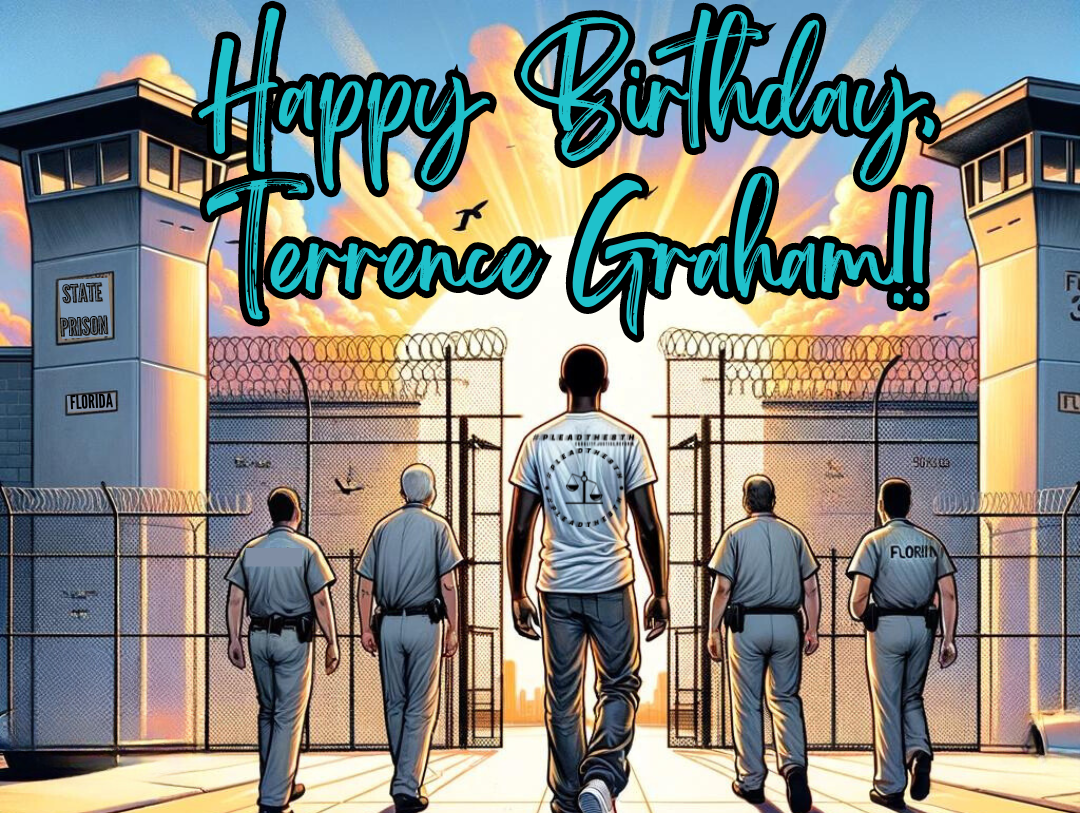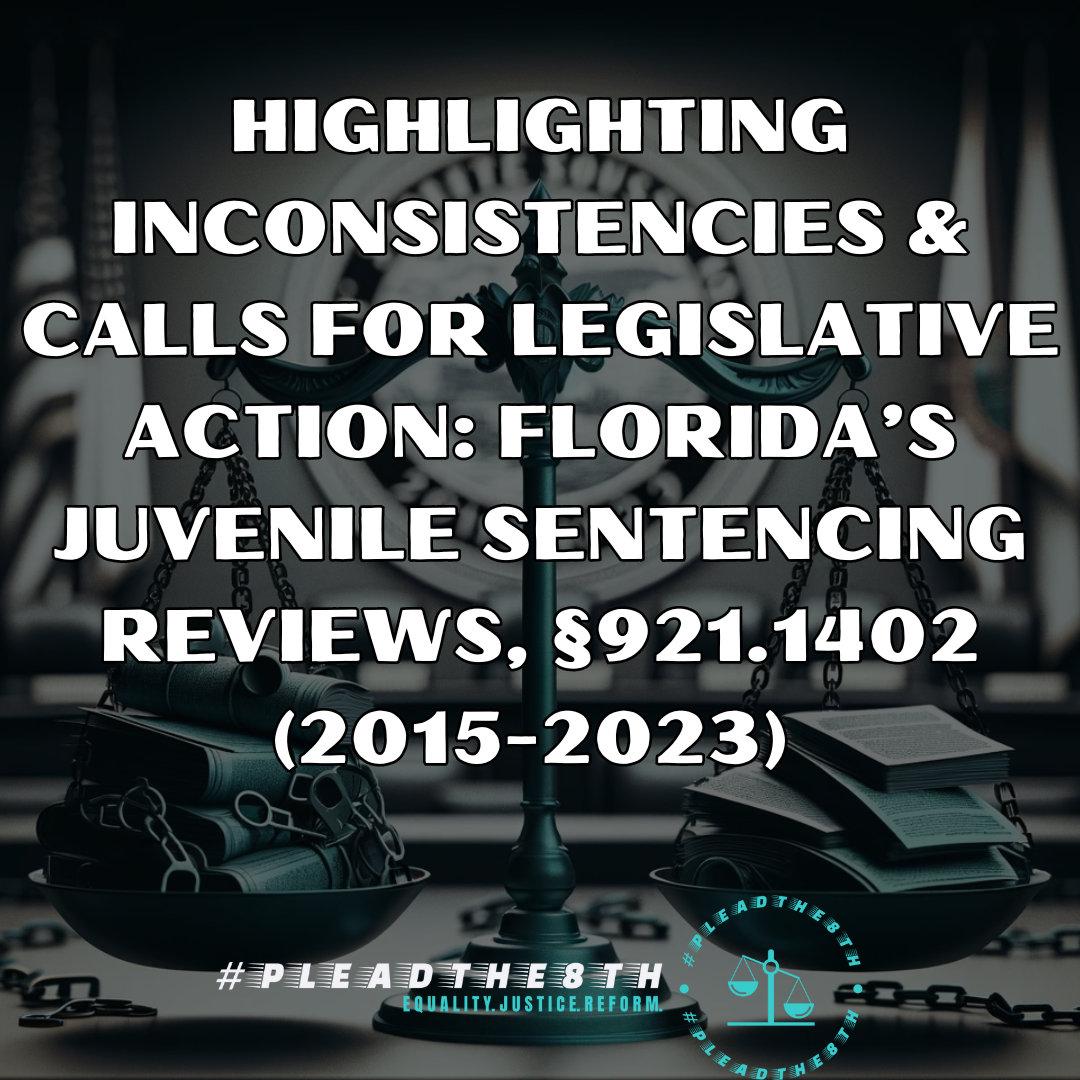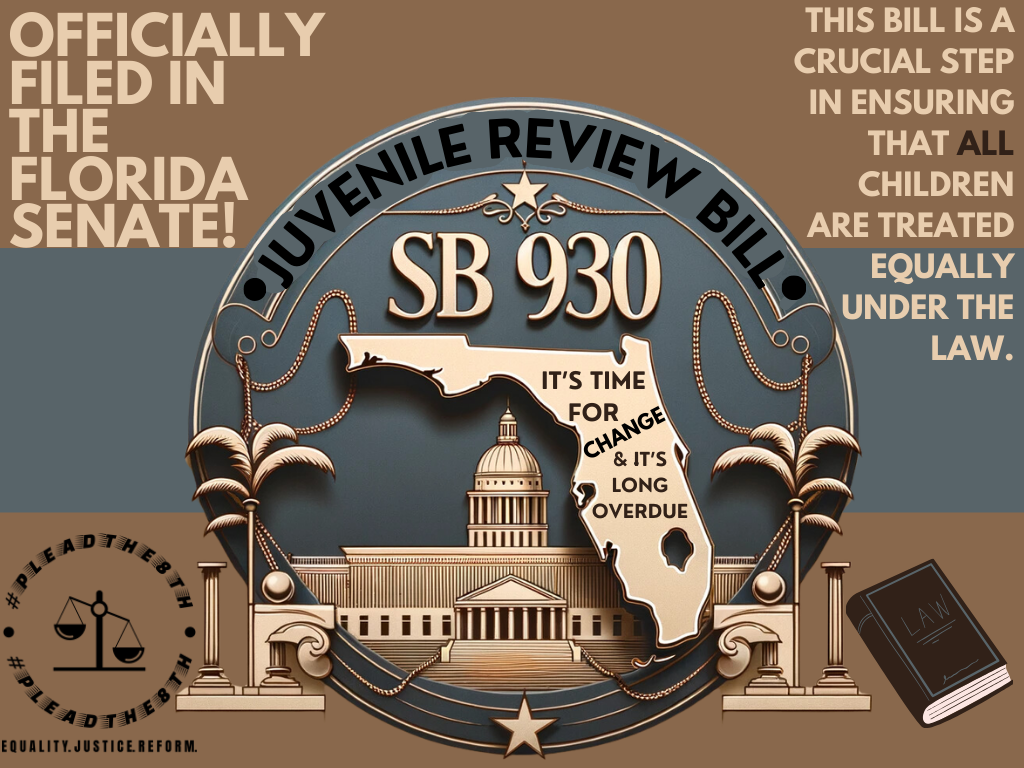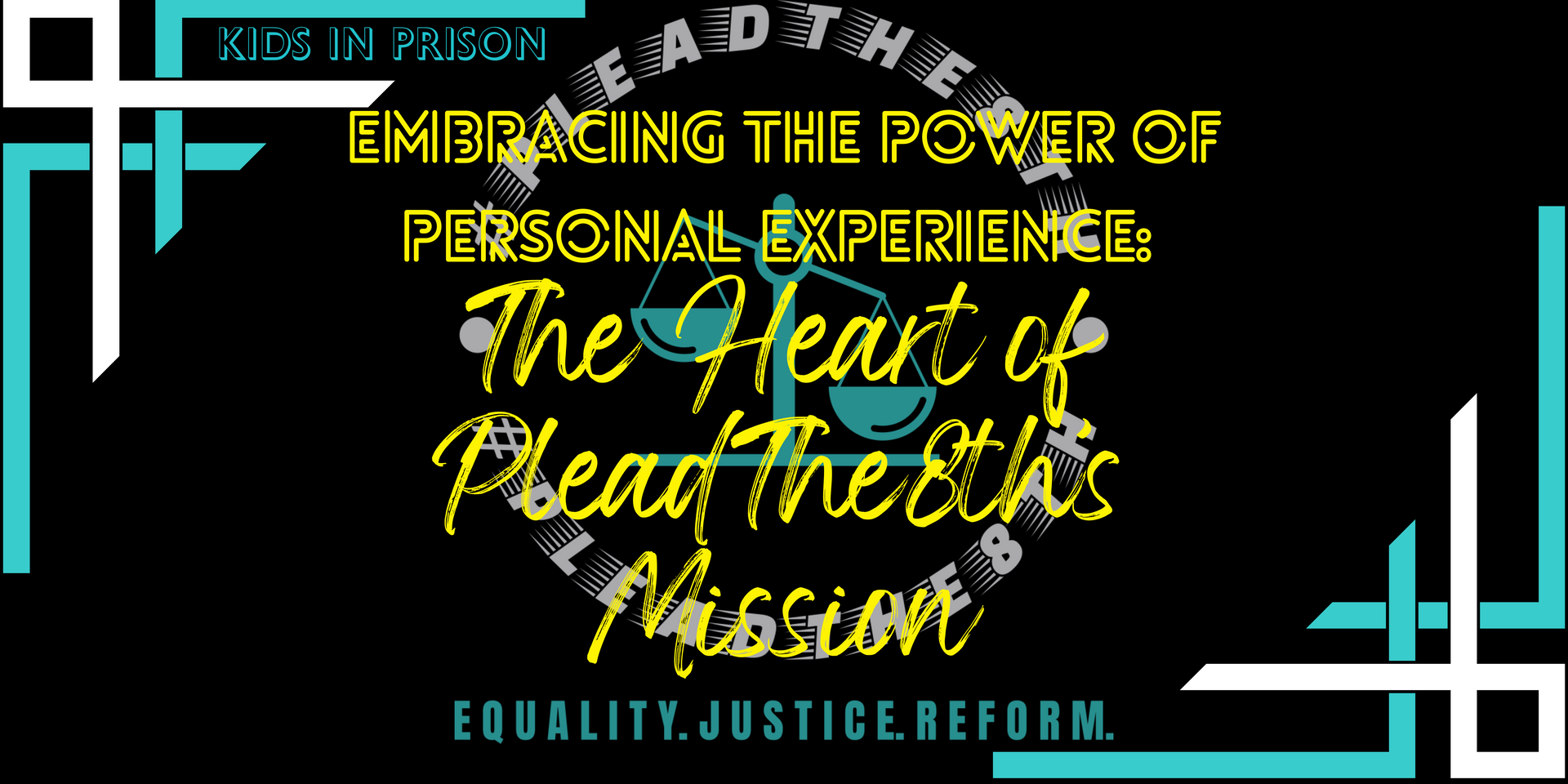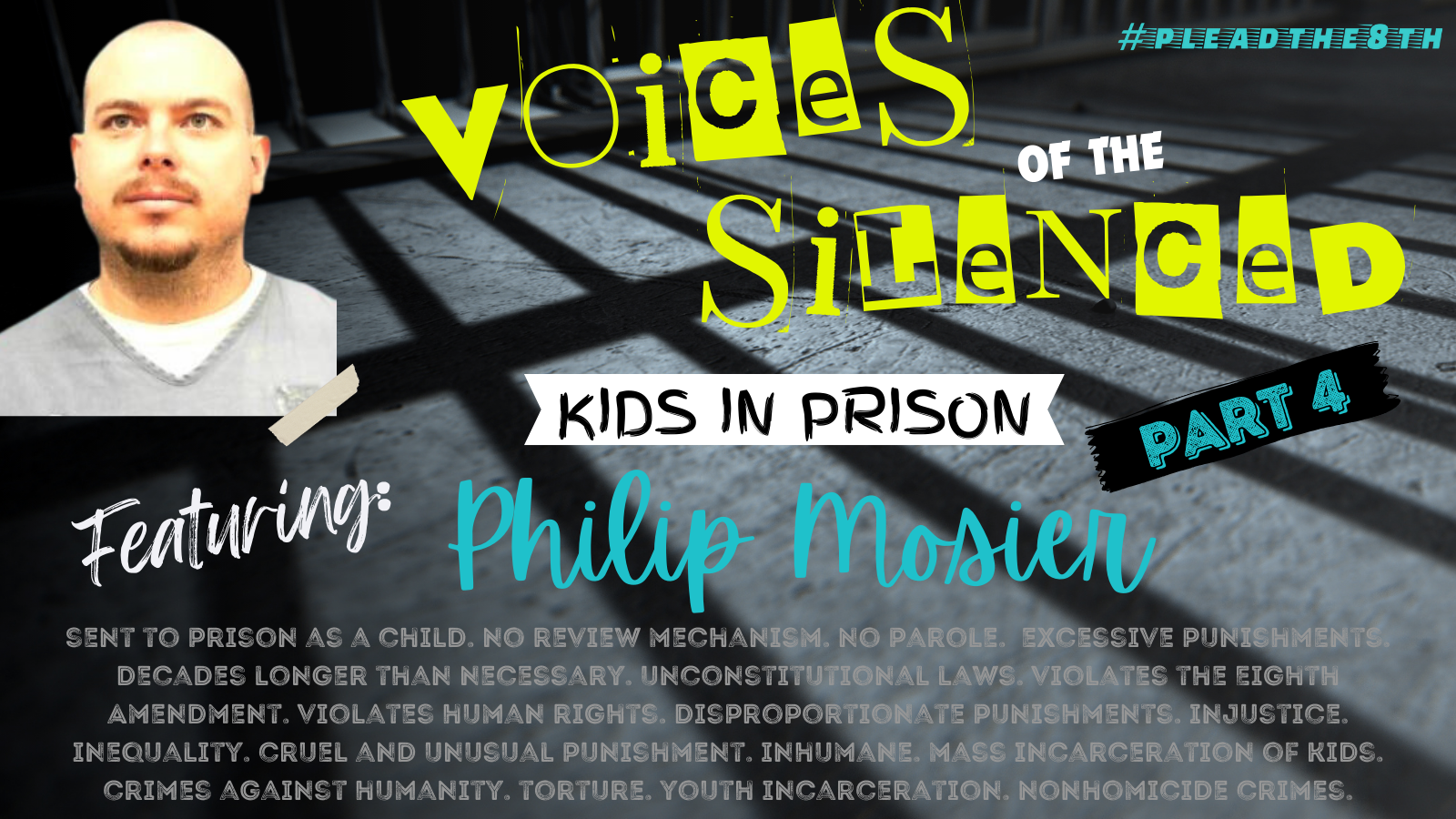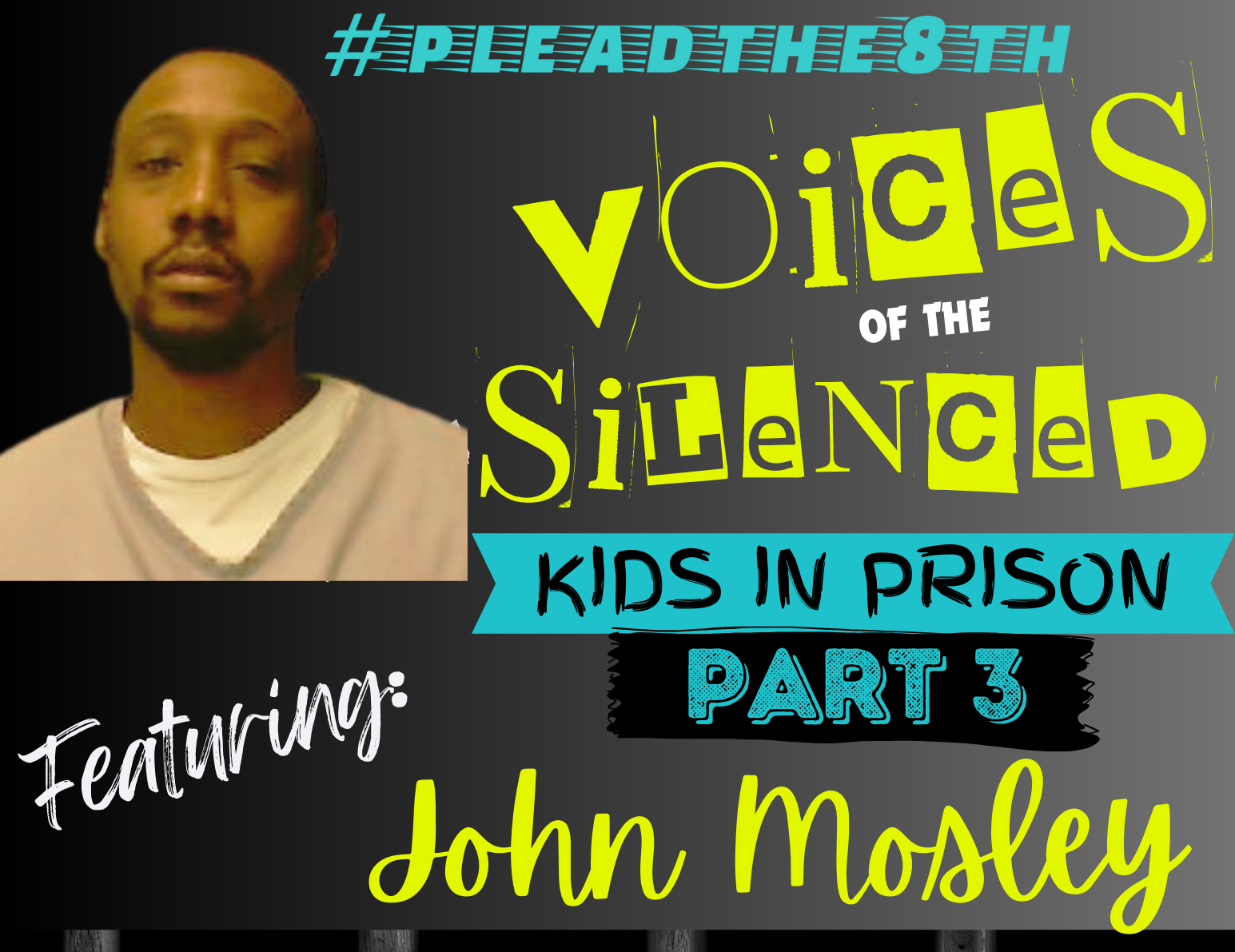Follow Us on Social Media!
Florida's Failure in Juvenile Sentencing Reform
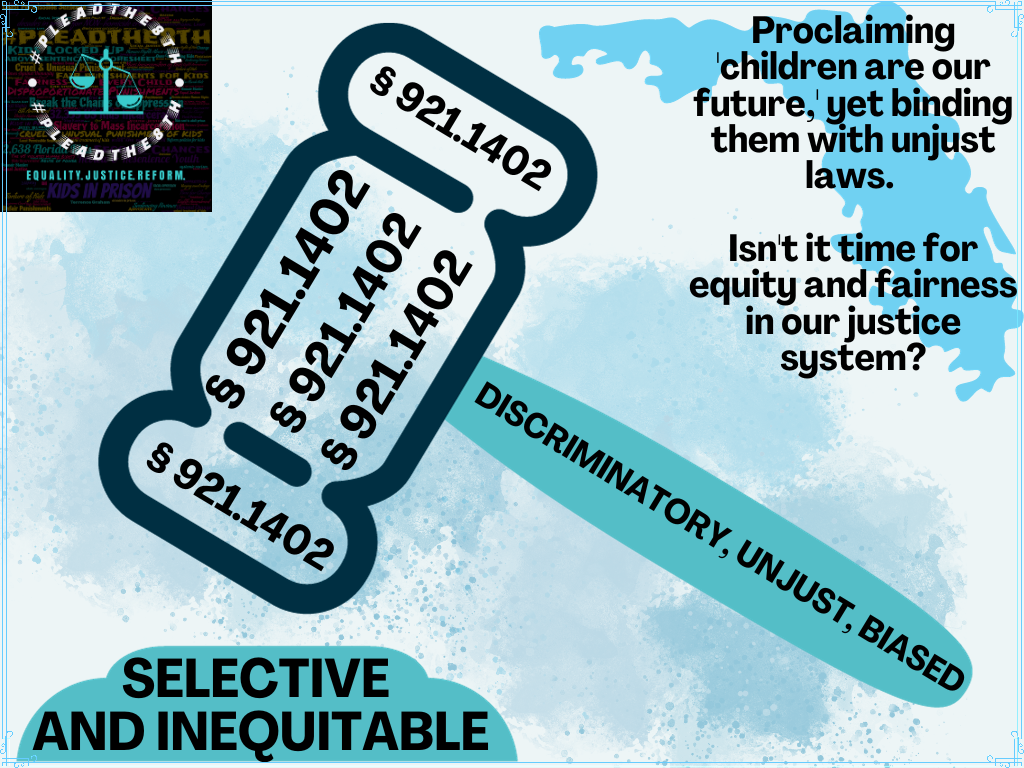
Will Rachaun Blount Finally See Justice?
BARTOW, FL – Originally granted a resentencing opportunity in 2018, Rachaun Blount's chance for a fair hearing was delayed for five years. At the age of 16, Blount received a harsh 40-year sentence for a non-homicide offense. Now, his resentencing is finally scheduled for June 5, 2024, highlighting systemic failures in juvenile justice. PleadThe8th is spotlighting severe disparities in juvenile sentencing and Florida's continued failure to align with established legal standards. Blount's resentencing presents an opportunity for the presiding judge and prosecutor to realign with Supreme Court directives and current sentencing practices.
This case also highlights a broader issue that PleadThe8th emphasizes: the excessive punishments of children, particularly those sentenced before 2014, and the inequitable law that does not allow those children to have a review of their sentence if they commited the offense before 7/1/2014 with a term of years sentence.
BACKGROUND OF RACHAUN BLOUNT
▶ EXCESSIVE PUNISHMENT: 40 Years for a Non-Homicide Offense
In 2014, Rachaun Blount was sentenced to 40 years in prison for a non-homicide offense by Judge Catherine Combee of Polk County. His case stands out not only due to the severity of his sentence and the dramatic discrepancy between sentencing recommendations—a least permissible punishment of 7.8 years per his guidelines scoresheet and a 10-year plea deal offered initially—but also because his upcoming resentencing, now scheduled for June 5, 2024, at 8:30 AM, presents a unique opportunity.
▶ FIVE YEARS+ AWAITING HIS RESENTENCING GRANTED IN 2018
Back in 2018, during a short time when Florida courts were interpreting US Supreme Court cases to mean that "all" youth were entitled to resentencing if they did not have an "opportunity to display maturity and rehabilitation," Rachaun Blount was granted a resentencing hearing. Let's remind folks that Florida is a state without parole, so there are no types of reviewing cases and you will serve 85% of your sentences, and if any part is a mandatory minimum, then 100% of that.
▶ UNIQUE, YET INEQUITABLE, OPPORTUNITY
Before Blount was resentenced after being granted the hearing, Florida case law changed, and he was then denied and has spent the last 5 years fighting for the resentencing hearing that was initially granted in 2018. Blount, unlike many others—some who were unaware of the courts ruling this way for the short time period around 2016 to 2019, and others who were not in the Appellate court—didn't have a mandate for resentencing. Blount differs here as he was ordered by the Second District Court of Appeals to be resentenced. (See below.)
Therefore, unlike approximately 1,000 other youths sentenced before 2014 under harsh conditions and denied any chance for resentencing or sentence review, Blount has the opportunity to be resentenced with a proportionate punishment or, at the very least, a review mechanism (pursuant to §921.1402) incorporated into his sentence. This critical distinction underscores the need for comprehensive legislative reform to address these inequities.
So now, in 2024, he has an opportunity to be resentenced that shouldn’t be delayed further.
Furthermore, under this law, a juvenile goes back to the court in which they were originally sentenced for the "review" or "resentencing." Thus, Mr. Blount goes back in front of the original judge, Catherine Combee, that sentenced him to 40 years in prison for a non-homicide crime, in which he was offered a 10-year plea deal prior to going to trial and had a 7.8-year scoresheet total.
Will she give him a proportionate punishment on Wednesday?
Florida Youth Sentencing Pre-and Post-2014
and Judicial Inconsistencies
Sentenced at age 16 to 40 years for a non-homicide offense, Rachaun Blount’s severe penalty exemplifies the draconian sentences prevalent before key U.S. Supreme Court decisions in Graham v. Florida (2010) and Miller v. Alabama (2012), and thus the Florida legislative changes in 2014. Despite the statewide reforms in 2014, Florida’s practices remain inconsistent, particularly for cases predating these changes and Florida continues to enforce punitive measures rooted in outdated tough-on-crime policies.
Common Misconceptions and Legislative Issues
The common misconception is that "all" youth are entitled to a review hearing at 15, 20, and 25 years. In fact, this is not happening in the state of Florida. You can read our "Court Inconsistencies and Calls for Legislative Action" report that details how Florida statute 921.1402 has been applied inconsistently in the courts and the current state of the law that does not allow juveniles who were sentenced pre-enactment 2014 with lengthy terms to have a resentencing or review hearing. Along with numerous other constitutional issues that have been noted by the courts for the last decade with zero action from the legislature, perhaps it is time for the governor to act to ensure all youth are treated equally under the law.
▶ Read More on Florida Statute 921.1402.
PleadThe8th was successful in filing a bill to amend the numerous issues with the §921.1402 law in the 2024 legislative session (SB930/HB1041). While it didn't progress, PleadThe8th is in its first year of establishment, and working daily to bring awareness to the issue and fight for equality and proportional punishments for children in the state of Florida.
Supreme Court Precedents vs. Florida’s Practices:
The U.S. Supreme Court’s decisions in cases like Graham v. Florida and Miller v. Alabama emphasizes the need for juvenile sentencing to consider cognitive development and the potential for rehabilitation. However, Florida's inconsistent application of these principles highlights a glaring need for state-level reform.
Initially, after a
series of rulings Florida courts interpreted these
US Supreme Court rulings to mean
all
youth without a review mechanism were entitled to resentencing and reviews. Yet, since
Pedroza v. State in 2020, this interpretation has shifted. Now, Florida's
juvenile review law selectively applies, allowing only certain youths resentencings and to have their sentences reviewed, while
excluding
those sentenced
before 2014 with lengthy terms. This selective application highlights a critical need for reform to ensure
equitable
treatment of children. PleadThe8th advocates that
all
youth, not just some, should have the opportunity to show if they have been rehabilitated and matured since their youthful offense. In essence, that
all children are treated equally under the law.
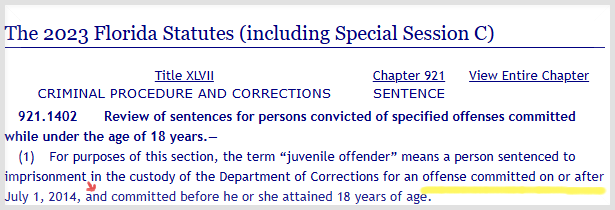
As articulated in the oral opinion announcement for Miller v. Alabama, “And most fundamentally, those cases make clear that youth matters in determining the appropriateness of certain penalties, that the imposition of a State's most severe penalties on juvenile offenders cannot proceed as though they were not children” (Miller v. Alabama, 567 U.S. (2012), part 1 of oral opinion announcement).
▶ Supreme Court precedents affirm that “What the State must do, however, is give defendants like Graham some meaningful opportunity to obtain release based on demonstrated maturity and rehabilitation.” (Graham v. Florida, 560 U.S. 24).
▶ “The juvenile should not be deprived of the opportunity to achieve maturity of judgment and self-recognition of human worth and potential.” (Graham v. Florida, 560 U.S. 28).
▶ “The Eighth Amendment’s prohibition of cruel and unusual punishment guarantees individuals the right not to be subjected to excessive sanctions” (Roper v. Simmons, 543 U.S. 560).
▶ This foundational right is derived from the “basic precept of justice that punishment for crime should be graduated and proportioned to both the offender and the offense,” echoing the sentiments expressed in Weems v. United States (217 U.S. 349, 367 (1910)) (Miller v. Alabama, 567 U.S. 6 (2012)).
▶ Furthermore, as articulated during the oral opinion announcement in Graham v. Florida, “the concept of cruelty in sentencing is not merely descriptive but inherently carries a moral judgment, reflecting the evolving standards of decency that mark the progress of a maturing society” (Graham v. Florida, oral opinion announcement).
Key Statistics Highlight Systemic Injustices:
Data analyzed from the Florida Department of Corrections reveal that juveniles sentenced for robbery before 2014, like Mr. Blount, face an average sentence exceeding 21 years, compared to just 9.7 years for those sentenced afterward. This 12-year discrepancy highlights a punitive approach out of step with current understandings of juvenile rehabilitation.
- Of the
401
robbery cases, only
38
juveniles received sentences of
40
years or more, all sentenced
pre-2014, showcasing a severe misalignment with today’s standards.
The graph below displays the excessive punishments handed out by county to youth pre-2014 for robbery offenses, like Mr. Blount, which sharply contrasts with the sentencing practices of those post-2014.
This trend of declining sentences post-2014 is consistent across all offense categories.
- Overall sentencing averages pre-2014 are over 23 years, while post-2014 drop to just 10.7 years.
- 90.4% of pre-2014 youth received sentences of 10 or more years, compared to just 48.3% post-2014.
- 76.5% of pre-2014 youth received 15 or more years, compared to only 26.5% after 2014.
- 59.8% of pre-2014 youth received 20 or more years, while only 14.5% after 2014 faced such lengthy sentences.
Sentencing Guidelines Upward Departures:
The data provided below highlights a significant issue in the sentencing of juveniles in Florida. It shows an astounding contrast between the recommended sentencing guidelines and the actual punishments given to these young individuals.
The "Sentencing Guidelines Scoresheet Total" column represents the suggested (or "least permissible") sentence based on the individuals Criminal Punishment Code Scoresheet totals, while the "Punishment" column shows the actual sentence given, as well as the “difference” between the two.
This analysis shows that children have received punishments that far exceed what is appropriate, necessary, or recommended. Oftentimes youth face punishments that far exceed sentencing scoresheet guidelines, mandatory minimum laws, and state averages.
This data aligns with Supreme Court precedent that, “If more serious crimes are subject to the same penalty, or to less serious penalties, that is some indication that the punishment at issue may be excessive” (Graham v. Florida, 560 U.S. 9, citing Solem v. United States, 463 U.S. 291).
The Broader Issue:
Florida Children Are Locked Up Without a Key with Excessive Punishments Under Inequitable Laws
Children have been the subjects of punishments that far exceed what is warranted, resulting in decades longer in prison than necessary in a state with no parole for possible early release, and under an inequitable juvenile review law that does not allow all children the same opportunities for review of their case.
As noted previously, approximately 1,000 other young people sentenced to harsh terms before 2014 cannot have their sentences reviewed due to current laws. Blount’s resentencing on June 5, 2024, includes the possibility of a proportionate punishment and/or adding a review mechanism to his sentence, setting his case apart and illustrating the urgent need for legislative reform to correct these disparities and inequitable treatment.
EXAMPLES OF INEQUITABLE TREATMENT:
If two children committed the same crime but one on June 30, 2014, and the other on July 1, 2014, and both children received the same 40-year punishment, only the child who committed the offense on July 1 would be entitled to a review of their case. This inequitable treatment persists because the current laws do not allow juveniles with crimes before July 1, 2014, to have their sentences reviewed. Therefore, the child with the 40-year sentence for the crime on June 30th will face the entire 40-year punishment. The child who committed the crime on July 1 will have an opportunity for a review hearing at 15, 20, or 25 years (depending on the crime) and will have an opportunity to show the court if they've matured and are fit to reenter society. If the court agrees, the child is released at that point and placed on probation for 5 years. Thus, due to a one-day difference of June 30th and July 1st, one child would serve the full 40 years, while the other only 20 years.
Moreover, if two juveniles had the exact same punishment and crime, yet one was granted a resentencing (with the ability to get the review added during the resentencing) by the appellate court, but the other child was only granted a resentencing by the trial court, the child with the appellate mandate is getting resentenced, while the other child in the trial court, although initially granted, is denied.
How does this inequitable treatment exist? Why have Florida lawmakers allowed this to continue for over a decade despite repeated calls from the judiciary to fix it? Why has the governor not stepped in? Are we protecting children as lawmakers claim? Or do these children not deserve our protection because they are in prison? Despite being unjustly incarcerated, as you see with the sentencing data and scoresheet guidelines that show decades-longer than necessary punishments.
PleadThe8th's Stance:
“It’s time for Florida to wake up and address the injustices in our juvenile sentencing system,” said Jessica Richardson, Founder of PleadThe8th. “Children like Mr. Blount are locked up for decades longer than necessary, deprived of the opportunity to show they've grown. Meanwhile, newer cases receive sentences that reflect an understanding of what justice should be and are afforded the right to show they’ve changed. This is not just a failure of law; it’s a failure of morality and justice.”
PleadThe8th urges immediate legislative action to reform Florida’s
juvenile sentencing laws, advocating for uniform application of review mechanisms that align with
Supreme Court
directives. This reform is essential for ensuring
all
children are treated equally under the law and can demonstrate their rehabilitation and readiness to rejoin society.
PleadThe8th's SUPPORT LETTER
for Rachaun Blount's Resentencing
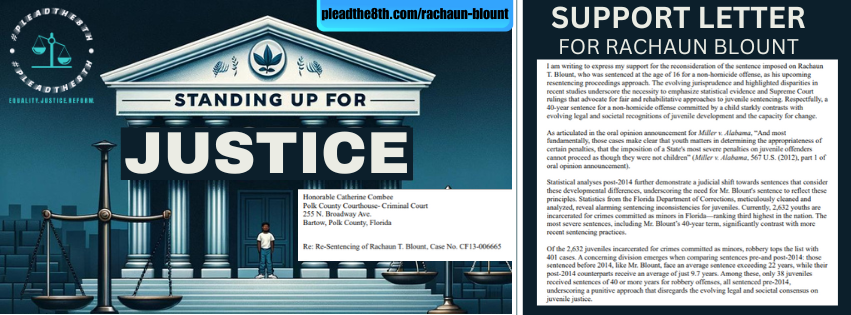
Election Year Irony:
Quite ironically, this is an election year, and the judge presiding over Blount’s case has an opponent in the upcoming election. PleadThe8th reached out to this individual, Mr. Greg Abaray, to ask his thoughts on juvenile sentencing practices and the need for juvenile justice reform, yet we have not received a response. PleadThe8th urges leaders and those aspiring to be leaders to engage with their constituents, especially on critical issues like juvenile justice reform.
Event Attendance Call-to-Action:
PleadThe8th invites the public to support fair treatment under the law and oppose excessive punishments for children by attending Blount’s hearing on June 5th, 2024 at Polk County Courthouse. Your presence will signal community support for our youth and press for needed legal reforms.
6/5/24 UPDATE:
- JUDGE CATHERINE COMBEE WILL DETERMINE BLOUNT'S SENTENCE ON 7/11/24 @ 8:30 AM, POLK COUNTY COURTHOUSE.
@pleadthe8th 40 years for non-homicide crimes is unacceptable. We will continue to speak out about the injustices youth face in Florida. We demand fair sentencing, equal laws, and second chances for children. #PleadThe8th #JuvenileJusticeReform #FairSentencing #YouthJustice #AdvocacyInAction #StandUpSpeakOut #TikTokViral #ForYou #FYP #Trending #Viral #Inspiration #SocialJustice #YouthVoices #ChangeTheSystem #Advocacy #Reform #Florida #FloridaJustice #PolkCounty #BartowFL
♬ original sound - #PleadThe8th
Support the Cause: Visit Our Fundraiser!
As we continue to fight for juvenile justice reform, you can show your support by visiting our fundraiser and grabbing some PleadThe8th gear. Whether it's for an upcoming hearing or to raise awareness in your community, your support helps us keep pushing for change. Check out the
PleadThe8th Justice Gear Fundraiser
now and make a difference!
SUPPORT FAIR SENTENCING AND EQUAL TREATMENT OF CHILDREN:
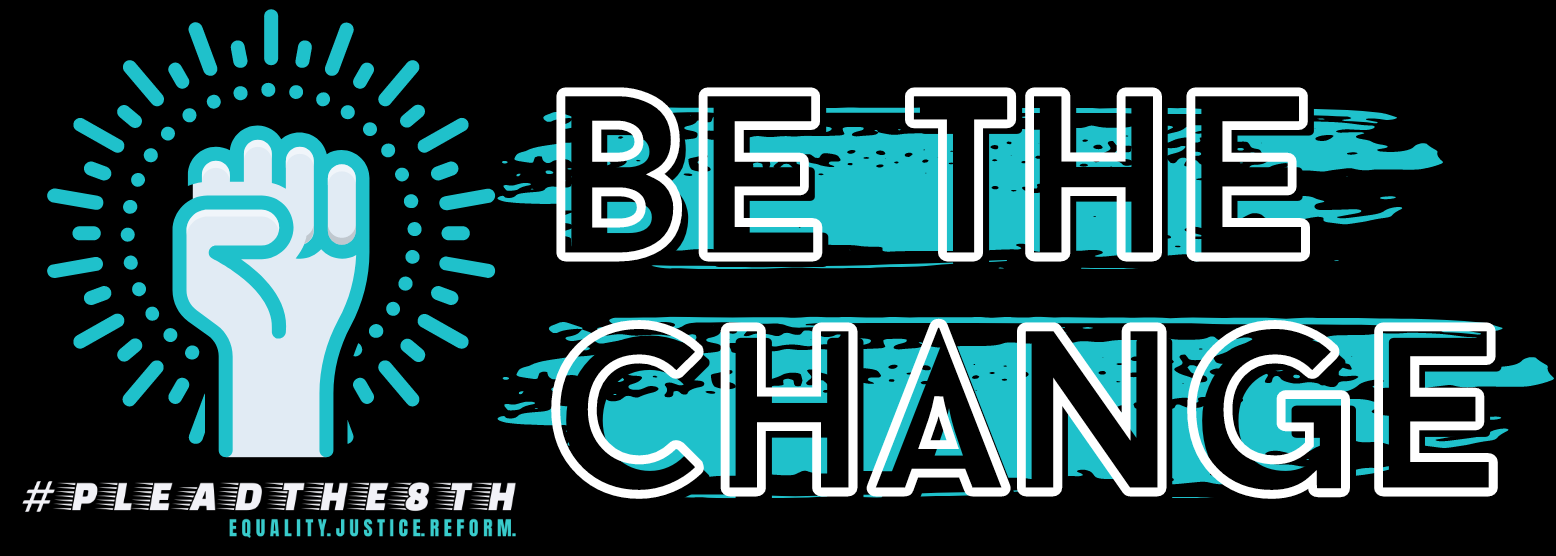
@pleadthe8th Join us in demanding justice and fair sentencing for our youth. #PleadThe8th #JuvenileJustice #FairSentencing #JusticeReform #PolkCounty #Florida #Accountability #SCOTUS #Reform9211402 #reform #justice #brainscience #incarceration #prison #kidsinprison #useyourvoice #VoteForChange #StandForJustice #YouthJustice #socialjustice #prisonreform #youthincarceration #humanrights #cruelandunusual #8thamendment #eighthamendment #fy #trending ♬ Big Beat (Two AM Music Global) - Adriane Palikat
@pleadthe8th #RachaunBlount #Resentencing #PolkCounty #PleadThe8th #LawyerFail #injustice #justicedelayedisjusticedenied #justice #equality #legislation #florida #policies #laws #demandchange #changemaker #youth #youthjustice #juvenilejustice #activism #activist #advocate #educate #courts #scotus #grahamvflorida #socialjustice #court #Judge #excessive #prison #massincarceration #endmassincarceration #kidsinprison #juvenilelifers #lifeinprison #prisonreform #juvenilejusticereform #reform #criminaljustice ♬ original sound - #PleadThe8th
@pleadthe8th A 40-year sentence for a non-homicide crime (no parole, no review) significantly contrasts with today's legal and societal understanding of juvenile culpability and rehabilitation. #PleadThe8th #facts #socialchange #youthjustice #youthjusticereform #crimesagainsthumanity #humanrights #youth #standup #speakout #advocate #educate #cruel #unusual #punishment #sentence #8thamendment #corruption #factsoverfeelings #rachaunblount #floridayouth #reform9211402 #scotus #grahamvflorida #millervalabama #juvenilesentencing #youthmatter #secondchance #secondchances #activism #activist #explore #explorepage #influencer #changemymind #changemaker #demandchange #change #draconian #laws #policies #florida #legislation #polkcounty #racism #equality #justice #justicedelayedisjusticedenied #injustice ♬ original sound - #PleadThe8th
Leave us a comment.
Voices of the Silenced:

"I would love to help with this cause anyway I can. I have met some good guys behind these walls, many like me that have spent their childhood and most of their adulthood behind these walls."
-Kenneth Burden
"I accepted a plea deal for a 40 year cap believing I was going to get a youthful offender sentence. I guess you know that didn't turn out as planned. At 17 years old, I was sentenced to thirty years in prison for each of my crimes followed by ten years of probation. I couldn't even comprehend that. Hell, I hadn't even been alive but for 17 years, how could I imagine spending the next thirty years of my life in prison?"
-Philip Mosier
"I've been saying for the longest , the only way to make a difference is to make such a loud noise the world can't help but listen."
-Jessy Burrows
"I wouldn't wish this journey on my worst enemy and its sad to say this place only makes you one of two ways: better or worse and with the odds stack against you. People tend to become worse because there's no type of rehabilitation in here."
Write your caption here-Deon Gilchrist
"I was sixteen the day I got arrested, not knowing nothing but thinking I knew it all. It's sad because when you live you learn (we all make mistakes) but giving teenager's double + the years they are in age doesn't allow any progress looking further in the future. "
Write your caption here-Rachaun Blount
"I am the 8th. I stand as living proof that the system can and must evolve to provide fair and proportionate justice for all."
Write your caption here– Terrence Graham, Co-founder, PleadThe8th
“It's unfair that I'm still getting punished for something that happened 20 years ago. I'm a changed man, I don't get disciplinary reports and I stay out of trouble. I'm just ready to get out and let everyone see the new me. I was 17, now I'm 37.”
Write your caption here– John Mosley
" I PRAY AND HOPE WE DO FIND A BREAKTHROUGH AND CHANGE THE LAW. I ALSO UNDERSTAND THAT THIS WON'T BE AN EASY BATTLE WE ARE FIGHTING AN LONG AND UP HILL BATTLE AND HOPE THAT WE HAVE WHAT IT TAKES TO MAKE A DIFFERENCE!"
Write your caption here-JATAVISH HARRIELL
"I have been in prison since I was 17 years old. I've been locked up for 10 years on a 45 year sentence. This applies to me. I hope you guys can get us some relief. Please keep me updated on what progress you guys make, please and thank you."
Write your caption here-Devin Rivera
"I have been in prison since I was sixteen and believe me, I know that things need to change, because people change. After all, that's what make us human."
Write your caption here-Allen Bythwood
"I am one of the many youthful offenders incarcerated in the prison system. I am interested in doing anything I can possibly do to help the movement in the strive towards justice for our youth. I thank you for everything you are doing. It's a blessing to have people finally being a voice for the ones who were silenced by the system for so long. Again, thank you."
Write your caption here-Juny Abraham
"I was 17 years old when I came into the system. I don't have no murder and no one got physically hurt in my case. I ended up with 40 years with 30 of that mandatory. I was 17 at the time of the robberies. As of now, I've been in prison longer than I was living before I came to prison. I'm hoping you can help with this law getting changed. I was railroaded and surely did not deserve so long."
Write your caption here-Ronnie Ricks
"I am incarcerated for 2 counts of armed robbery that I didn't commit, even the victim stated that the female involved was a white female. I am an African American woman. I need all the help there is to be able to get my sentence of 27.5 years overturned. I would greatly appreciate it if this movement gets going. I have already served 14 years in jail and prison altogether and I'm ready to serve my community as I go back out into society and give myself another chance. Thank you for contacting me, I really am grateful."
Write your caption here-Geneva Kellum
"Mothers and fathers have been grieving of the loss of their kids for years holding on to faith and prayers which they depend on to live with their hurt. I am now 31 years old and have been incarcerated since the age of 17. I am overwhelmed with pain from this incarceration, overwhelmed with the loss of family members, most recent loss was my father. It seems like only a few people in my family actually know I exist. I used to be mad and disappointed when I see people in America on tv and especially soical media it constantly reminded me how forgotten and overlooked this situation was. Then i realize it's not that the people didn't care, they simply didn't know, WE WERE OVERLOOKED, I was one of the juveniles sentence to life in prison and didn't kill anyone, then resentence to 50 years, sentence to the same amount or more time than an adult who did commit murder, sentence by an corrupt system. After doing over 11 years in prison, I was fortunate enough to be resentence recently leaving me with less then 8 years."
Write your caption here-Daryl Thomas
Check out our other blogs!
Kids in Prison: Voices of the Silenced. #PleadThe8th
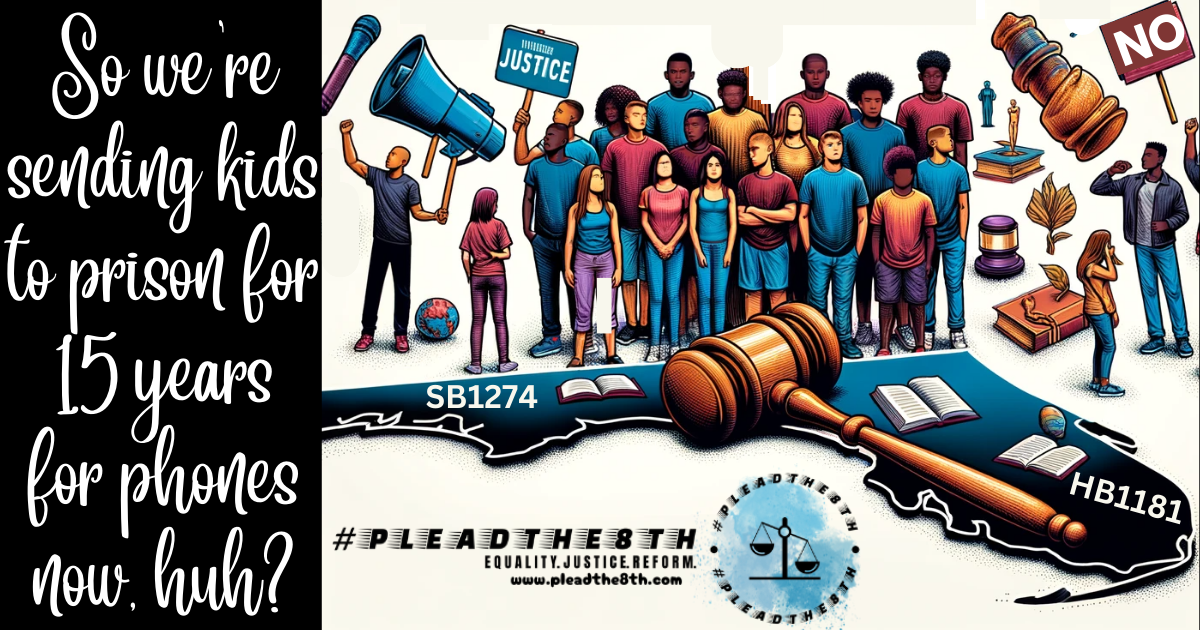
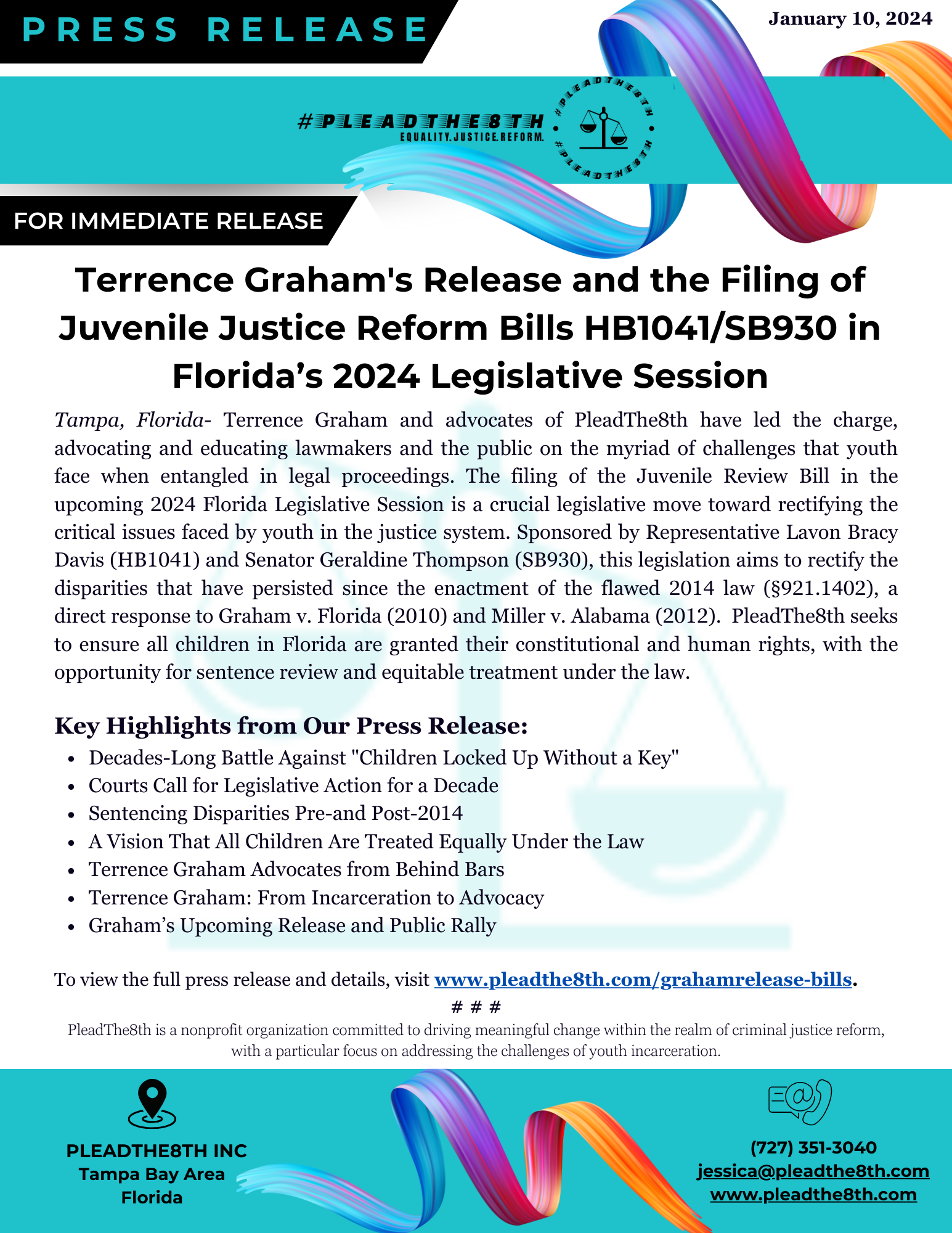
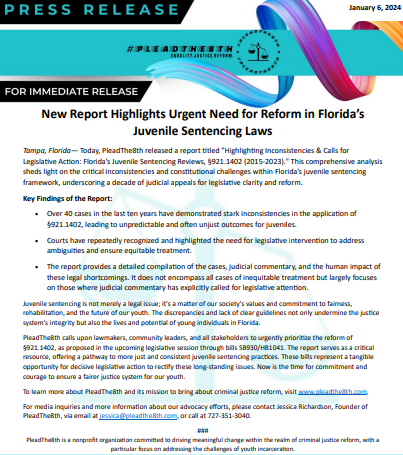
Your Support Matters
A gift today helps us fight for kids without a voice.
PleadThe8th
is a qualified 501(c)(3) tax-exempt organization and donations are tax-deductible to the full extent allowed under the law.
Follow us on Social Media!
Tweet & Share to remind those in power that we demand justice and equality.
